democracynow.org
Stories:
 As Earth Reaches Frightening CO2 Milestone, Bill McKibben Calls for War on Climate Change
As Earth Reaches Frightening CO2 Milestone, Bill McKibben Calls for War on Climate Change
We are under attack from climate change—and our only hope is to mobilize like we did in WWII," says Bill McKibben, co-founder of 350.org, in an extended interview in our New York studio. "It’s not that we need to go to war with climate change, it’s that we are under siege." This comes as 2016 is on track to be the hottest year ever on record and Republican presidential candidate Donald Trump has said if he is elected, he will weaken the U.S. Environmental Protection Agency, abolish President Obama’s Clean Power Plan, promote fossil fuel exploration and recruit oil and gas executives to lead his Cabinet.
TRANSCRIPT
This is a rush transcript. Copy may not be in its final form.
JUAN GONZÁLEZ: This year may be only half over, but 2016 is already on track to be the hottest year ever on record. In the midst of this, during the first presidential debate on Monday, Republican presidential candidate Donald Trump and his Democratic rival, Hillary Clinton, sparred briefly over climate change.
HILLARY CLINTON: Take clean energy. Some country is going to be the clean energy superpower of the 21st century. Donald thinks that climate change is a hoax perpetrated by the Chinese. I think it’s real.
DONALD TRUMP: I did not. I did not.
HILLARY CLINTON: I think the science is real.
DONALD TRUMP: I do not say that.
HILLARY CLINTON: And I think it’s important—
DONALD TRUMP: I do not say that.
HILLARY CLINTON: —that we grip this and deal with it, both at home and abroad.
JUAN GONZÁLEZ: Clinton was referring to a tweet Trump sent in 2012 in which he wrote, quote, "The concept of global warming was created by and for the Chinese in order to make U.S. manufacturing non-competitive." Trump later said he meant it as a joke, yet he has continued to suggest climate change is some sort of hoax. His comments were highlighted this week in a new TV ad produced by the Sierra Club.
DONALD TRUMP: All of this with the global warming and the—that—a lot of it’s a hoax. It’s a hoax. I mean, it’s a money-making industry, OK?
BILL O’REILLY: They said that you called climate change a hoax. Is that true?
DONALD TRUMP: Well, I might have. I believe that climate change is not man-made. We’re going to cancel the Paris climate agreement. Our president is worried about global warming. What a ridiculous situation.
JUAN GONZÁLEZ: That’s right, Donald Trump has said that if he is elected, he will weaken the U.S. Environmental Protection Agency, abolish President Obama’s Clean Power Plan, promote fossil fuel exploration and recruit oil and gas executives to lead his Cabinet.
Well, our next guest writes in the New Republic about, quote, "A World at War: We’re under attack from climate change—and our only hope is to mobilize like we did in WWII." Quote, "Day after day, week after week, saboteurs behind our lines are unleashing a series of brilliant and overwhelming attacks. In the past few months alone, our foes have used a firestorm to force the total evacuation of a city of 90,000 in Canada, drought to ravage crops to the point where southern Africans are literally eating their seed corn, and floods to threaten the priceless repository of art in the Louvre."
AMY GOODMAN: Our guest goes on to write, "The enemy is even deploying biological weapons to spread psychological terror: The Zika virus, loaded like a bomb into a growing army of mosquitoes, has shrunk the heads of newborn babies across an entire continent; panicked health ministers in seven countries are now urging women not to get pregnant. And as in all conflicts, millions of refugees are fleeing the horrors of war, their numbers swelling daily as they’re forced to abandon their homes to escape famine and desolation and disease.
"World War III is well and truly underway. And we are losing."
Those are the words of Bill McKibben, who joins us today in our New York studio, co-founder of 350.org, author of a number of books, including Eaarth: Making a Life on a Tough New Planet. His other new piece in the New Republic is headlined "Recalculating the Climate Math."
Bill, welcome back to Democracy Now!
BILL McKIBBEN: Well, it’s good to be here.
AMY GOODMAN: So, you just heard the clip from the first presidential debate. You are certainly escalating the discussion about where climate change needs to fit into this. Talk about what the candidates have said and what you think actually needs to happen.
BILL McKIBBEN: Well, the context is, July and August were the two hottest months we’ve ever measured on this planet, and, in fact, the scientists who look at the proxy records from before we had thermometers tell us that July and August were probably the two hottest months in the history of human civilization. Against that backdrop, to see a buffoon like Trump, you know, playing games with climate change is sobering, but it’s also sobering to realize that, you know, none of our political leaders have said what we need to do on the scale we need to do it.
If we’re going to have a chance of dealing with climate change, it means mobilizing in ways that we haven’t in a very long time. And one of the points of writing this first piecefor the New Republic this year was to demonstrate that at least that was possible. If you go look at how America mobilized during World War II, the industrial might that we brought to bear, and then you do the calculations, it’s at the outside edge of possible that we could, in the short time that we have, build enough solar panels and wind turbines. But it’s going to take the same kind of focused effort.
JUAN GONZÁLEZ: But your use of the analogy of war for a country that is involved in war at the drop of a hat—war on terrorism, war on poverty, war on drugs.
BILL McKIBBEN: War on cancer, yes.
JUAN GONZÁLEZ: Yeah, and not to mention all the shooting wars, as well.
BILL McKIBBEN: All the actual wars, yeah.
JUAN GONZÁLEZ: The actual wars. Your decision to use that analogy?
BILL McKIBBEN: So the point, in this case, was that—I mean, the war on drugs is a completely phony idea, right? It’s just a way of justifying all sorts of bad ideas. In this case, it’s not that we need to go to war with climate change, it’s that we’re under siege. I mean, by all the measures by which one thinks about warfare, we’re in one. We’re losing territory all the time. I mean, there are literally islands disappearing. You know, we’ve lost huge swaths of the coral in the world this year alone. A wave of warm water swept across the Pacific and the Indian Ocean. In many places, 80, 90 percent of coral died in a matter of weeks, these atolls that have been there forever in the Arctic. You know, ice that’s been there for millennia upon millennia is now gone. I mean, the world looks entirely different from a satellite now than it did 30 years ago. So, the question is not whether or not we’re in a conflict. The question is whether or not we’re going to fight it, or whether we’re going to keep listening to the Exxons of the world and do nothing.
AMY GOODMAN: So, in this piece you do, "Recalculating the Climate Math: The numbers on global warming are even scarier than we thought," what shocked you most? Go through those numbers.
BILL McKIBBEN: This comes from a remarkable report from a group called Oil Change International in New York. And you’ll remember that a few years ago we talked about the sort of new climate math that launched the fossil fuel divestment movement. At that time, what we understood was that the world’s fossil fuel industry had far more—far too much carbon in its reserves, five times as much as we could afford to burn. What this new study indicates—and it’s important to kind of get this—is that the coal mines and oil and gas fields that we already have in production have enough carbon in them to take us past the 2-degree mark that the U.N. has said is the line for catastrophe.
That is, we—there’s nothing about the future anymore. We literally can’t build anything else and stay within those limits—no Dakota pipeline, no new coal mines in Australia, none of the things that our political leaders—I mean, Justin Trudeau in Canada two days ago green-lighted a massive LNG project on the British Columbia coast. In the light of this new climate data, it’s completely clear that these things, we just can’t do. We can’t drain most of what’s in the fields that we’ve already got in production. But as that dwindles, we have to be replacing it, day by day, with renewable energy instead.
JUAN GONZÁLEZ: And how do you feel in terms of the amount of time devoted to the issue of climate change in all of the debates, previously among the Democrats and Republicans, and now in the first actual presidential debate?
BILL McKIBBEN: In the course of the whole debate season, by far the high point was when the senator from my home state of Vermont stood up, and someone asked him at one of the debates, "What’s the most important challenge facing the world?" and he said, "Climate change." And two weeks later, at the next debate, after all the editorialists had tut-tutted about how he should have said it was terrorism or something, they asked him again, and he said it again. OK? That’s a good sign, a good sign that he’s the most popular politician in America. But it hasn’t yet fully filtered down into the—you know, into the Clinton campaign, and certainly not the Trump campaign. The Democratic platform is very, very good on these issues. One hopes that if Ms. Clinton is elected, we’ll be able to press her to try and live up to that platform.
AMY GOODMAN: You weren’t feeling as encouraged when you served on the Democratic Platform Committee, and you described this in your piece. Explain what happened—
BILL McKIBBEN: So, I was—
AMY GOODMAN: —what you’re calling for, and what ultimately—
BILL McKIBBEN: I was depressed halfway through, because when the Platform Committee, which Bernie had asked me to serve on—we took a series of votes, and we lost, seven to six, you know, on sort of party-line votes, on all sorts of things. But then, Bernie refused to concede. He didn’t back down. He didn’t do what everyone told him he should do. He kept in the race through the final meeting about the platform in Orlando two weeks before the convention. And he did that in order to ensure that he’d have leverage in those discussions. That’s what he—I mean, it’s not like eight years ago when what Hillary Clinton wanted was for Barack Obama to pay off her campaign debt. What he wanted was progress on the issues.
And as a result, by staring them down, the platform, at the last minute, turned markedly more progressive. Among other things, there’s a call in there for an emergency climate summit within the first hundred days of a new administration, designed to—and it says this in the platform—mobilize us for something like a World War II approach to climate change. We’ll see if we can hold them to it. Clearly, it will take hundreds of thousands of people in the street, just like there were in New York two years ago this month.
AMY GOODMAN: We’re going to go to break, and then we’re going to come back to this discussion with Bill McKibben, co-founder of 350.org, author of two pieces in the New Republic, most recently, "Recalculating the Climate Math" and "A World at War: We’re under attack from climate change—and our only hope is to mobilize like we did in WWII." Stay with us. ...Read More → Bill McKibben: Dakota Access Pipeline Resistance Powerful Enough to Overwhelm Fossil Fuel Industry
Bill McKibben: Dakota Access Pipeline Resistance Powerful Enough to Overwhelm Fossil Fuel Industry
We speak with 350.org’s Bill McKibben about how the Standing Rock Sioux Tribe and members of hundreds of other tribes from across the U.S., Canada and Latin America have resisted construction of the $3.8 billion Dakota Access pipeline, even as police carrying assault rifles responded to them with armored vehicles, tear gas and helicopters. "We cannot pump more oil," McKibben says. "Frontline communities, and particularly indigenous people, have been in the forefront of this climate fight." He also discusses Hillary Clinton’s failure to take a stance on the project and how some unions have supported the resistance.
TRANSCRIPT
This is a rush transcript. Copy may not be in its final form.
AMY GOODMAN: This is Democracy Now!, democracynow.org, The War and Peace Report. I’m Amy Goodman, with Juan González. Our guest is Bill McKibben, co-founder of 350.org. Among his books, Eaarth: Making a Life on a Tough New Planet.
JUAN GONZÁLEZ: Bill, I’d like to ask you about the specifics of this massive move that’s necessary toward dealing with climate change. You mentioned in your writing Mark Jacobson, a Stanford professor who’s developed a—who’s been studying this for years, has come up with a model for how each state in the union could be able to deal with reachable goals. Can you talk about some of the specifics that he has?
BILL McKIBBEN: So you can’t believe how detailed the work that this team at Stanford has done. I mean, if you go into their database and ask how many acres of south-facing roof there are in Alabama that aren’t shaded by trees where you could put solar panels, a number pops up. And now the same for most of the countries in the world. And what they demonstrate is that it’s within both economic and technical possibility to, by 2030, be getting 80 percent of our power from renewable energy. It’s not easy, because the fossil fuel complex is the center of our economy, and there is an huge amount of sunk investment that people would have to write off. But that’s a hell a lot cheaper than the cost of dealing with a planet that no longer works the way it has for the last 10,000 years.
JUAN GONZÁLEZ: And the industry now, you turn on the TV any day, and you see their campaign for the energy voter.
BILL McKIBBEN: Yes. The fossil fuel industry knows that their back is against the wall. They know that they have a losing hand. I mean, look what’s going on in the Dakotas. No sane person could look at the pictures that Democracy Now! provided from the Standing Rock Reservation with dogs sicced on protesters trying to protect their water—
AMY GOODMAN: Why don’t we go to just a clip of that. This was September 3rd, Labor Day weekend. Native Americans at these massive resistance camps of now thousands did not expect that the Dakota Access pipeline, the $3.8 billion pipeline, was going to be excavating at this point. It was a holiday weekend. They were going to plant their tribal flags in a ceremony. And what they found shocked them—bulldozers in full gear. The security guards were there with pepper spray. They assaulted, attacked, tackled the Native Americans, and they sicced dogs on them.
PROTESTER: These people are just threatening all of us with these dogs. And she, that woman over there, she was charging, and it bit somebody right in the face.
AMY GOODMAN: The dog has blood in its nose and its mouth.
PROTESTER: And she’s still standing here threatening us.
AMY GOODMAN: Why are you letting their—her dog go after the protesters? It’s covered in blood!
AMY GOODMAN: So, that was the scene. Describe what is actually taking place here and what is at stake, why the Dakota Access pipeline would want to hurt these protesters.
BILL McKIBBEN: So, first thing to understand that what’s taking place there is the—everybody else acknowledging what some of us have known for a long time, which is that frontline communities, and particularly indigenous people, have been in the forefront of this climate fight. They were in the Keystone fight, and now clearly in the Dakotas. They’re holding the line against something that threatens not only their reservation, but threatens the whole planet. We do not—we cannot pump more oil. We’ve got to stop opening up new reserves.
Their work there is astonishing. Against all odds, they’ve been able, at least for the moment, to bring a temporary halt to some of that construction, giving, one hopes, cooler heads a chance to look at the available data and common sense to prevail. Earlier this year, the president said that any new project should have to pass a climate test. There is an even stiffer version of that in the next Democratic platform. This pipeline couldn’t pass those climate tests. It should be stopped. Thank heaven for the bravery of those people and, really, for the environmental justice movement that’s sprung up all around the country. Not even have sprung up—you know, today we’re celebrating the 50th anniversary of UPROSE, the—really, one of the original, seminal environmental justice outfits here in New York. That’s where the leadership is coming from, and it’s really powerful to see.
AMY GOODMAN: What’s Hillary Clinton’s stance on the Dakota Access pipeline?
BILL McKIBBEN: One has no idea. She has so far refused to say anything about it. Let’s hope that that changes, because this is not only a practical challenge, at this point it’s a clear moral test. I mean, look, on the long list of oppressed people on this continent, it’s—you know, that may—they may be at the absolute top of the list. The idea that we’re putting dogs on people in 2016, that we have pictures that look just like the pictures from Birmingham in 1963, that should be enough to cause revulsion among any, any normal person looking on.
JUAN GONZÁLEZ: And given the fact that we’re still dealing with a Congress controlled by climate change deniers, what do you think could still be done by a president, either President Obama, in his last few months, or Clinton, if she is elected, through executive action to be able to move forward on this issue?
BILL McKIBBEN: Well, there are certain things that the president can do. And one of them, a sort of obvious, straightforward one, is to stop allowing people to drill for oil and gas and mine coal on public land, on federal land in this country. That’s something like half the carbon deposits in America, are on federal land. The Obama administration, finally, late in the game, has stopped allowing new coal leases, at least for the time being, but that should go to fracking and oil wells and everything else. At the very least, we should take public land off the table, because the president can do that.
AMY GOODMAN: Bill, you’ve talked in The New York Times about you, yourself, being persecuted. Can you talk about who has been going after you, photographing you, and what this is all about?
BILL McKIBBEN: There’s an outfit called America Rising Squared, or something, some kind of right-wing GOP fossil fuel industry sort of thing—no one quite knows where their money comes from. And they announced earlier in the year that they were going to do opposition research and video tracking on a level that previously had been reserved, as they said, for presidential candidates. So, yes, sometimes now, often now in public, there are people following me everywhere with cameras and stuff. I don’t—I mean, look, it’s not a lot of fun, but compared to what’s happening to people in other places, I can live with it. It’s not like, you know—
AMY GOODMAN: But what are they doing exactly?
BILL McKIBBEN: Well, they’re tracking me everywhere I go.
AMY GOODMAN: This isn’t just when you’re at a public protest.
BILL McKIBBEN: No, it’s—I give a speech, or I’m in the—you know, they follow me. And, you know, so once or twice I’ve had to sort of go into the men’s room to try and, you know—it’s just designed to get in one’s head, I guess. And frankly, sometimes it does a little bit. But I don’t—I really want to say, look, there are environmental activists who are now getting shot in this world on a weekly basis, people in countries that are trying to stop mines, stop pipelines. I mean, it’s a great luxury to be in America, at least until we elect Donald Trump, that we don’t have to worry quite in those ways. The real point is that the fossil fuel industry will do anything—anything—to avoid actually talking about the issue. And the issue is that if they keep their business model going, then the planet tanks. That’s where we are.
JUAN GONZÁLEZ: I wanted to ask you about the role of the organized labor movement. There has been some change over the years in terms of the environmental movement and the trade union movement closer—getting closer together. But on the Dakota Access pipeline, the AFL-CIO has come out in favor of it. Your thoughts on that?
BILL McKIBBEN: The good news, if you want some, is that a bunch of unions have come out on the right side on this issue, and quite strongly—the communication workers, transport workers, nurses’ union, groups like that, and all the kind of caucuses within the AF of L, for communities of color, for—you know, these are important. One understands why the construction trades want to build pipelines. Look, these are good jobs, and they pay good wages. It’s too bad that the world literally can’t absorb the carbon that flows through these things, OK? It would be easier for the whole world if we did—if physics and chemistry were pliable, easy negotiating partners, that we could just say we’d like a few more years of this or whatever. But I do think that this is an important moment for labor, as for everybody else. What’s going on in the Dakotas is indefensible, just literally indefensible. And what’s powerful to see there is the oldest wisdom on this continent matching up perfectly with the newest scientific events. That’s a powerful combination. I think it’ll be powerful enough maybe to overwhelm even the financial might of the fossil feel industry.
AMY GOODMAN: There’s been this terrible accident in Hoboken with the trains, the train smashing into the Hoboken station when it should have stopped. Now, we don’t know what happened to the engineer, the person who was driving. But the question was: Why didn’t it stop even if something had happened to him, a heart attack or whatever? We have enormous investment in the highways of this country. The whole issue of investment in mass transit—I mean, the discussion on all of the networks nonstop: You know, was it terrorism? Well, no, it wasn’t terrorism. But the question of where is the investment in mass transit?
BILL McKIBBEN: Well, let’s talk about investment in infrastructure generally. I mean, the great opportunity in the first months of a Clinton administration would be a serious grand bargain for serious investment in infrastructure, especially around renewable energy, but around mass transit, around all kinds of things.
AMY GOODMAN: That also means massive number of jobs.
BILL McKIBBEN: Exactly right. Exactly right. This is the future that Bernie Sanders was talking about. And it’s going to take—we’ve got to put serious numbers on the table. You know, the talk in the moment, sometimes Secretary Clinton will talk about $250 billion. It’s got to be many multiples of that, because we are deep, deep in the hole. And when people say we don’t have the money, well, at the moment, money is cheap for a lot of reasons. What we really don’t have the money for is somehow trying to deal with a world where the ocean is rising. You’ve seen in the last few months an increased focus on what’s going to happen here in Manhattan over the next decades as the sea level rises. Think about, just in this one island, how much economic wealth is at risk if we let the planet keep going on the path it is going on now.
JUAN GONZÁLEZ: Well, and you mention this issue of this massive investment that’s needed immediately. Interestingly, when all the candidates came into the New York Daily News editorial board earlier this year, they all talked quietly, although they don’t talk about it publicly, that it’s commonly accepted that one of the things the new Congress will do is work out the amnesty for corporations that have trillions of dollars parked overseas because they don’t want to have to pay the corporate tax. So they all are expecting a huge infusion of money. The only question is, at what percent will they allow the amnesty, which is what it is, for all these corporations to bring their money home? And that’s where the government—that’s where Hillary expects to get all her infrastructure money. That’s where the Republicans expect to be able to cut taxes, all on the basis of this one—well, it’s not the one time, it’s the second major amnesty to corporations.
BILL McKIBBEN: Yes. I mean, there are ironies aplenty in that whole scheme. If we’re going to do it, let’s make sure that the get-out-of-jail-free card isn’t free, that it comes with a hefty price tag, because when we’re dealing with the infrastructure challenges, especially around renewable energy, that we have, you know, $100 billion doesn’t begin to cut it. I mean, we need actual big money. The kind of money that we’ve been spending on, say, the military for the last decades, that’s the kind of money that we need to face this challenge.
AMY GOODMAN: So, about a year ago, almost exactly, you were there in Vermont, in your hometown, standing with the sign—you got arrested for this, I think—in front of your ExxonMobil station that said, "This pump temporarily closed because ExxonMobil lied about climate." Now, in our headlines today, a new federal lawsuit targets ExxonMobil in what advocates say is the first legal action targeting the oil giant for its decades-long cover-up of climate change. Talk about this.
BILL McKIBBEN: It’s been a troubling year for Exxon. Just about exactly a year ago,InsideClimate News, the L.A. Times, the Columbia Journalism School started releasing probably the most important investigative reporting we’ve seen in a very long time. What it demonstrated was that our most important and largest fossil fuel company—indeed, for much of history, the largest company on Earth—had known everything there was to know about climate change, had used it in its own internal calculations to make sure they were prepared, you know, building their drilling rigs to cope with sea level rise, and at the same time lying to the rest of us, setting up this architecture of deceit and denial and disinformation.
Well, I wanted to make sure—I wanted to get arrested because I wanted to make sure those stories didn’t disappear, you know, in the daily wave of news that we all live under. And other people did similar things. And thank heavens, people started listening. Eric Schneiderman in New York state, the attorney general, quite bravely took on Exxon. He was followed by the AG in Massachusetts, Maura Healey. Last week, the SEC announced that they were joining this investigation. By the time we got the SEC on board, well, I mean, I guess they’ve made a federal case out of it. I mean, this is important. In fact, it’s pretty remarkable. And it’s a sign of just how far into this crisis we are.
JUAN GONZÁLEZ: But not only are these companies lying to the public, they’re also lying to their shareholders in terms of what is the actual value of the company, if they understand what is ahead in terms of global warming.
BILL McKIBBEN: That’s right. In fact, there’s a story today that indicates that Exxon, over the last seven or eight years, has quadrupled its holdings in the tar sands in Canada, that it’s now 35 percent of their reserves are in those tar sands. This is in InsideClimate Newstoday. The idea that they’re going to be able to get all that oil out seems unlikely to me. I mean, we beat the Keystone pipeline. There’s unbelievable opposition to the Energy East and Kinder Morgan pipelines in Canada. If they’ve been—if their, you know, predictions for their economic future have been predicated on the fact that they’re going to be a tar sands giant, well, that may not have been a very good bet.
AMY GOODMAN: And finally, the Koch brothers. I mean, a lot of the Republican establishment has given up on Donald Trump, but they haven’t given up on the other races. Can you talk about the amount of money that the Koch brothers are pouring in right now to try to defeat candidates who are deeply concerned about climate change?
BILL McKIBBEN: I don’t know the exact numbers, but, apparently, with people—you know, people not spending their money on Trump, they’re spending it down ballot. And in places like, oh, in the Ohio Senate race, there’s been just a spigot of money turned on to benefit the fossil fuel industry’s sort of hired employees who are, you know, running. That’s—I mean, that’s sad on a number of counts. This is the place where things like Citizens United, where the rubber really meets the road, because we cannot afford another two years or another four years of inaction on climate. We’ve had it for a quarter-century, and it’s yielded us the highest temperatures in human civilization.
AMY GOODMAN: Bill McKibben, we want to thank you for being with us. We will link to your pieces in the New Republic, "A World at War: We’re under attack from climate change—and our only hope is to mobilize like we did in WWII" and "Recalculating the Climate Math." Bill McKibben is co-founder of 350.org and Schumann scholar at Middlebury College in Vermont.
This is Democracy Now! When we come back, the first time an Obama veto is overridden by Congress. We’ll speak with Medea Benjamin. Stay with us.... Read More → Medea Benjamin: If Americans Can Sue Saudis over 9/11, Drone Victims Should Be Able to Sue U.S.
Medea Benjamin: If Americans Can Sue Saudis over 9/11, Drone Victims Should Be Able to Sue U.S.
"Finally, we have an example of the U.S. Congress putting U.S. citizens above the relationship with the Saudi government," says CodePink’s Medea Benjamin in response to the vote by Congress to allow Americans to sue Saudi Arabia over the 9/11 attacks, overriding President Obama’s veto of the bill. The legislation would allow courts to waive claim of foreign sovereign immunity after an act of terrorism occurs within U.S. borders. "If innocent families [of drone attacks] were able to take the U.S. to court instead of seeing joining ISIS or al-Qaeda as their only resort, that would be a very positive thing." Benjamin is author of the book "Kingdom of the Unjust: Behind the U.S.-Saudi Connection."
TRANSCRIPT
This is a rush transcript. Copy may not be in its final form.
JUAN GONZÁLEZ: We turn now to Wednesday’s decisive vote by Congress to allow Americans to sue Saudi Arabia over the 9/11 attacks, overriding President Obama’s veto of the bill. It’s the first time during Obama’s presidency that his veto has been overridden by Congress. The Senate rejected the veto 97 to 1, while the House rejected it 348 to 77. This means the, quote, Justice Against Sponsors of Terrorism Act now becomes law. This legislation would allow courts to waive claim of foreign sovereignty immunity after an act of terrorism occurs within U.S. borders. The bill had passed both the House and the Senate earlier this year, but President Obama had vetoed it earlier this month. This is the president speaking to CNN on Wednesday.
PRESIDENT BARACK OBAMA: What this legislation did was it said if a private citizen believes that, having been victimized by terrorism, that another country didn’t do enough to stop one of its citizens, for example, in engaging in terrorism, then they can file a personal lawsuit, a private lawsuit in court. And the problem with that is that if we eliminate this notion of sovereign immunity, then our men and women in uniform around the world could potentially start seeing ourselves subject to reciprocal laws. And the concern that I’ve had has nothing to do with Saudi Arabia per se or my sympathy for 9/11 families; it has to do with me not wanting a situation in which we’re suddenly exposed to liabilities for all the work that we’re doing all around the world.
AMY GOODMAN: In July, the Obama administration declassified 28 pages from the September 11 report detailing possible ties between the Saudi government and the 9/11 attacks. The declassified documents raise new questions about the role of a Saudi consular official based in the Los Angeles area. He personally helped two of the hijackers after they arrived in Los Angeles in early 2000. Fifteen of the 19 9/11 hijackers were from Saudi Arabia.
The Saudi government financed an extensive lobbying campaign against the legislation but stopped short of threatening any retaliation if the law was passed. There was no official reaction from Saudi Arabia after the votes.
The override of President Obama’s veto comes as the Senate last week rejected a proposal to block the U.S. from supplying the kingdom with more than a billion dollars’ worth of tanks and other military hardware. Critics of the weapons deal say it could drag the U.S. into the Saudi-led war in Yemen and contribute to the humanitarian crisis there.
For more, we’re joined by Medea Benjamin, co-founder of CodePink. Her most recent book, Kingdom of the Unjust: Behind the U.S.-Saudi Connection.
Medea, if you can talk about the significance of this first-ever override of an Obama veto and what this means for Saudi Arabia?
MEDEA BENJAMIN: I think the significance is that, finally, we have an example of the U.S. Congress putting the U.S. citizens above the relationship with the Saudi government. And this is significant because, year after year after year, Congress has done nothing to stop arming to the teeth the Saudi government—$115 billion worth of weapon sales under Obama alone—a government that treats its own citizens with tremendous repression, beheads peaceful dissidents, treats women as minors their entire lives, has millions of foreign workers who are treated like indentured servants, and spreads this intolerant, distorted version of Wahhabism around the world. And the U.S. is not only arming the Saudi government, but is directly involved with the Saudis in the devastating war that’s going on in Yemen. So this sort of opens this issue up to much larger questions.
JUAN GONZÁLEZ: Medea, but what about the president’s argument on this issue of the impact in a broader sense to the United States, and also the talk now in the House and the Senate about revisiting this legislation with some carve-outs or some changes to it later?
MEDEA BENJAMIN: Well, actually, this legislation is quite narrowly written, and people don’t think that it will allow the payment of compensation, and the executive branch could stop the courts at any point. So, I think this question, though, about whether it would open up U.S. officials overseas to lawsuits, I actually think that could be a positive thing. For example, if the families of victims of drone attacks, innocent families, were able to take the U.S. to court instead of seeing joining ISIS or al-Qaeda as their only resort, that would be a very positive thing.
JUAN GONZÁLEZ: And, Medea, do you see any prospects of the Senate and the House revisiting this legislation?
MEDEA BENJAMIN: They certainly might revisit the legislation. They might make it even more narrow. But I think we should just look at the larger picture of what has happened since the Iran nuclear deal, since the reasoning, questioning of the Saudi weapons deals. And I think that we should start looking at all the areas that the Saudis have been using to buy consent in the U.S., giving large donations to Ivy League colleges, to think tanks, to the Clinton Foundation, to the John McCain foundation, paying eight different groups in Washington, D.C., as lobbyists—for example, Tony Podesta, the brother of John Podesta, who runs the—Clinton’s presidential campaign, receiving $140,000 a month from the Saudis. All of these things should come out now as we question the U.S. relationship with the Saudi government.
AMY GOODMAN: And what do you most want to find out, information coming out in lawsuits of the 9/11 families, about Saudia Arabia’s role, Medea?
MEDEA BENJAMIN: Well, there are, supposedly, 80,000 pages of documentation about relationships between the hijackers that we know nothing about, particularly those that live in Florida, in New Jersey, in Virginia. This has all been hidden from the public. And through the courts is the only way to get some of this information out. So I think it’s like ripping the band-aid off. Let’s see what’s underneath that. And then this really allows us to start the much broader issue of questioning.
And the fact that you just had on Bill McKibben talking about the devastating impact of the fossil fuel industry, let’s also connect that to Saudi Arabia, where the basis of our relationship has been, for decades, around oil, and now includes the Saudis propping up the military-industrial complex, being the, by far, largest purchasers of U.S. weapons.
AMY GOODMAN: Medea Benjamin, we want to thank you for being with us, co-founder of CodePink, author of Kingdom of the Unjust: Behind the U.S.-Saudi Connection.... Read More → Report: Donald Trump Violated US Embargo on Cuba in 1990s Even as He Called Castro a Brutal Dictator
Report: Donald Trump Violated US Embargo on Cuba in 1990s Even as He Called Castro a Brutal Dictator
A new investigation reveals Donald Trump’s businesses violated the U.S. embargo on Cuba and secretly did business there in the late 1990s and then tried to cover it up. The investigation draws on internal company documents showing Trump’s company, then called Trump Hotels & Casino Resorts, spent at least $68,000 in Cuba during a secret business trip to Havana. At the time, it was illegal under U.S. law to spend any corporate money in Cuba. We speak with Newsweek senior writer Kurt Eichenwald, who broke the story, headlined "Donald Trump’s Castro Connection."
TRANSCRIPT
This is a rush transcript. Copy may not be in its final form.
JUAN GONZÁLEZ: Well, in news from the campaign trail, a new investigation by Newsweek reveals that one of Donald Trump’s businesses violated the U.S. embargo on Cuba and secretly did business there in the late 1990s and then tried to cover it up. The investigation draws on internal company documents showing Trump’s firm, then called Trump Hotels & Casino Resorts, spent at least $68,000 in Cuba during a secret business trip to Havana. At the time, it was illegal under U.S. law to spend any corporate money in Cuba.
AMY GOODMAN: Only a year later, Trump wrote in an op-ed piece in the Miami Herald in '99, "I would rather take a financial hit than become a financial backer of one of the world's most-brutal dictators ... Of course, we should keep the embargo in place," he wrote.
Well, for more, we go to Dallas, Texas, where we’re joined by Kurt Eichenwald, who’s senior writer at Newsweek, contributing editor at Vanity Fair. His cover story for Newsweek is headlined "Donald Trump’s Castro Connection."
So, in these last few minutes we have together, Kurt, can you just lay out what you found?
KURT EICHENWALD: Well, very simply, that Donald Trump violated the Cuban embargo, and did so with a lot of planning. They did a business trip. They spent many, many thousands of dollars, which is completely illegal, visited—this is not Donald Trump personally. They sent someone from an outside company and reimbursed him for all the costs, but that was the way to do it. They met with government officials, financiers, businessmen, came back, plotted on how to make it look like this was actually a humanitarian effort sponsored by a charity. And then, after that, no deal came out of it, but seven months later, Trump was on the campaign trail running for the nomination of the Reform Party. And he said spending money in Cuba is giving it to Castro, and he’s a murderer. And, you know, while he’s standing there, he knows that he had just done that.
JUAN GONZÁLEZ: And the reason he did that, Kurt—
KURT EICHENWALD: So, it’s really—it’s shocking.
JUAN GONZÁLEZ: Kurt, the reason he did that at the time was just looking out for potential casinos in Havana, at the time that his own company was in financial trouble?
KURT EICHENWALD: Yes. There was—there were rumblings that the embargo might be about to be revised. And so Trump was trying to get, you know, a foot in the door. He was trying to get people on the ground in Havana who would help—you know, help with the government aspects, help with the financial aspects, help with the partnership aspects, and basically was getting braced to, like, dash through the door as soon as it started getting opened. It didn’t get open, and you’re not allowed to do that. It was illegal to begin with. And so, it was a—you know, it was a financial decision for what was then a very financially struggling company. And it just—you know, to me, what’s so shocking about it is how casually they broke the law, how casually—you know, the motivation of it was so—was so based in, you know, just financial calculations, trying to pull a lousy business out of the fire.
AMY GOODMAN: Now, Kurt, you have a lot of people who—a lot of—there are a lot of people who were opposed the embargo, who felt it was wrong, except Donald Trump would not be in that category publicly, because, as you point out in the Miami Herald, he said, "I would rather take a financial hit than become a financial backer of one of the world’s most-brutal dictators." How do you know, in this last minute, that Donald Trump directly knew about this $68,000 expenditure?
KURT EICHENWALD: Well, two things. First of all, the $68,000 was coming out from the very highest reaches of the company. It wasn’t like there was some accountant doing it. The president and chief executive officer were in charge. The chief financial officer was involved. And I know from people who were directly involved in the circumstances, who were there, that Trump knew and was fully on board. You know, you don’t write a $68,000 check and not—and it was actually a $100,000 check, because they were paying for other things, too—with a consultant that Trump is dealing with personally, and have nobody know about it. But, yes, he knew.
AMY GOODMAN: And the investigation that you did of the cover-up afterwards, of—
KURT EICHENWALD: With the—well, what that entailed was, after the money had been paid, there are ways for a humanitarian effort to be expended in Cuba that are legal. And it was: "Well, maybe we should try and make it look like this. Maybe we should get a charity to have sponsored our trip." It doesn’t work that way, and you can’t do a business deal or a business transaction or a business trip and then say, "Oh, let’s make it look like it’s a humanitarian trip."
AMY GOODMAN: Well, we’re going to have to leave it there. Kurt Eichenwald, thanks for joining us. We’ll link to your piece at Newsweek, Vanity Fair....Read More →Headlines:
U.N. Calls Aleppo a "Humanitarian Catastrophe" as Ceasefire Talks Fail
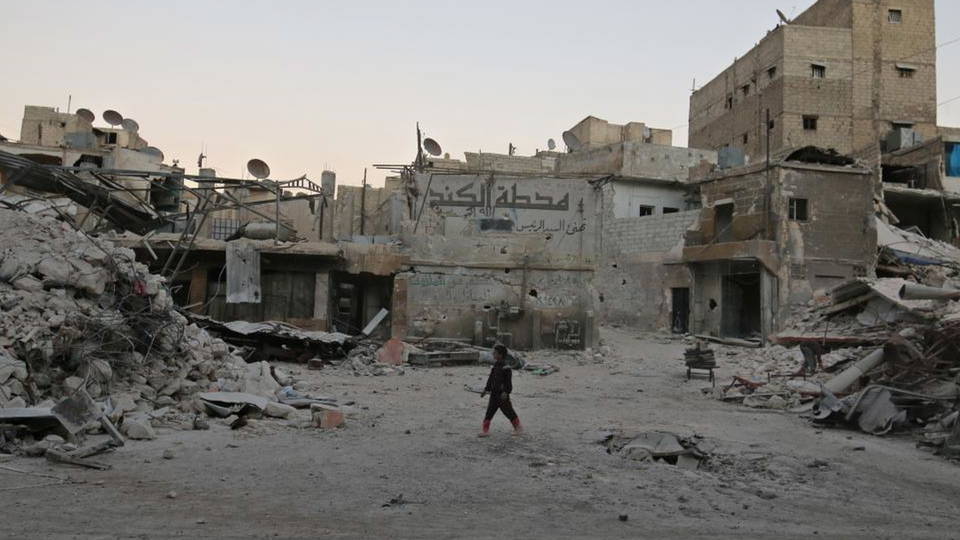 In Syria, Russian and Syrian warplanes continued a heavy bombing campaign in Aleppo, while troops massed east of the city and the United Nations warned of a humanitarian catastrophe. At least 100,000 children remain trapped in the eastern part of Aleppo, where the U.N. says food is nearly exhausted for more than a quarter-million people. U.N. humanitarian chief Stephen O’Brien told the Security Council that Aleppo had descended into a "merciless abyss of humanitarian catastrophe.”
In Syria, Russian and Syrian warplanes continued a heavy bombing campaign in Aleppo, while troops massed east of the city and the United Nations warned of a humanitarian catastrophe. At least 100,000 children remain trapped in the eastern part of Aleppo, where the U.N. says food is nearly exhausted for more than a quarter-million people. U.N. humanitarian chief Stephen O’Brien told the Security Council that Aleppo had descended into a "merciless abyss of humanitarian catastrophe.”
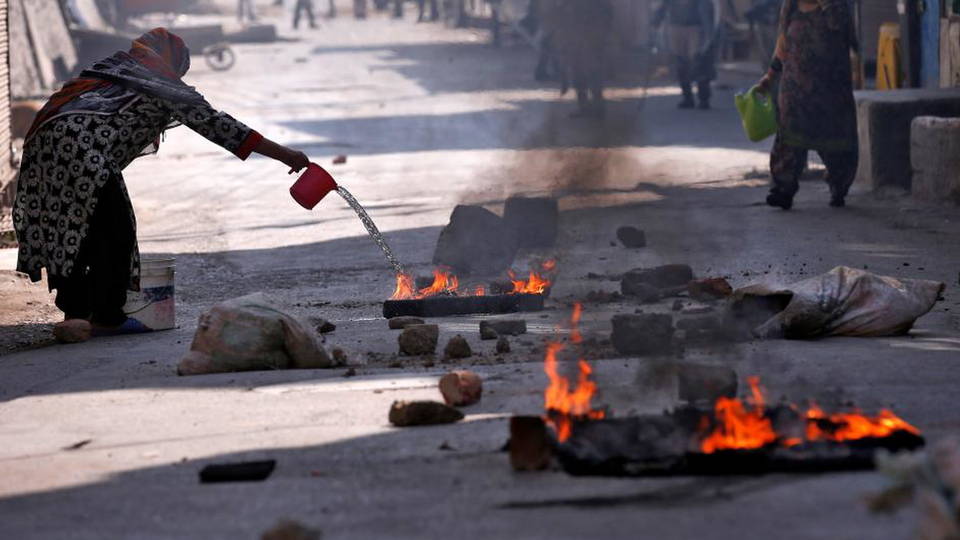 In Kashmir, Pakistan is vowing to defend itself against what it calls Indian aggression, after two of its soldiers were killed in cross-border fighting Thursday. India says it launched "surgical strikes" against militants in the disputed "line of control" region between Indian- and Pakistani-controlled Kashmir. Pakistan’s prime minister called an emergency Cabinet meeting over the latest fighting, which comes less than two weeks after an attack on an Indian army base killed 18 soldiers. India has ordered the evacuation of thousands of people in villages near its border with Pakistan.
In Kashmir, Pakistan is vowing to defend itself against what it calls Indian aggression, after two of its soldiers were killed in cross-border fighting Thursday. India says it launched "surgical strikes" against militants in the disputed "line of control" region between Indian- and Pakistani-controlled Kashmir. Pakistan’s prime minister called an emergency Cabinet meeting over the latest fighting, which comes less than two weeks after an attack on an Indian army base killed 18 soldiers. India has ordered the evacuation of thousands of people in villages near its border with Pakistan.
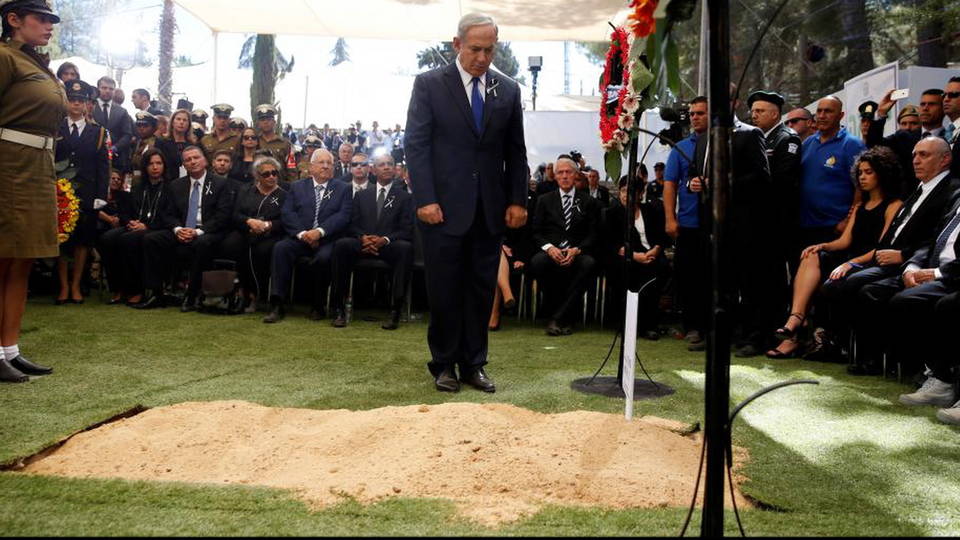 In Israel, world leaders gathered Friday for the funeral of former Prime Minister Shimon Peres, who died in Tel Aviv on Wednesday at the age of 93. Among those paying tribute was President Barack Obama.
In Israel, world leaders gathered Friday for the funeral of former Prime Minister Shimon Peres, who died in Tel Aviv on Wednesday at the age of 93. Among those paying tribute was President Barack Obama.
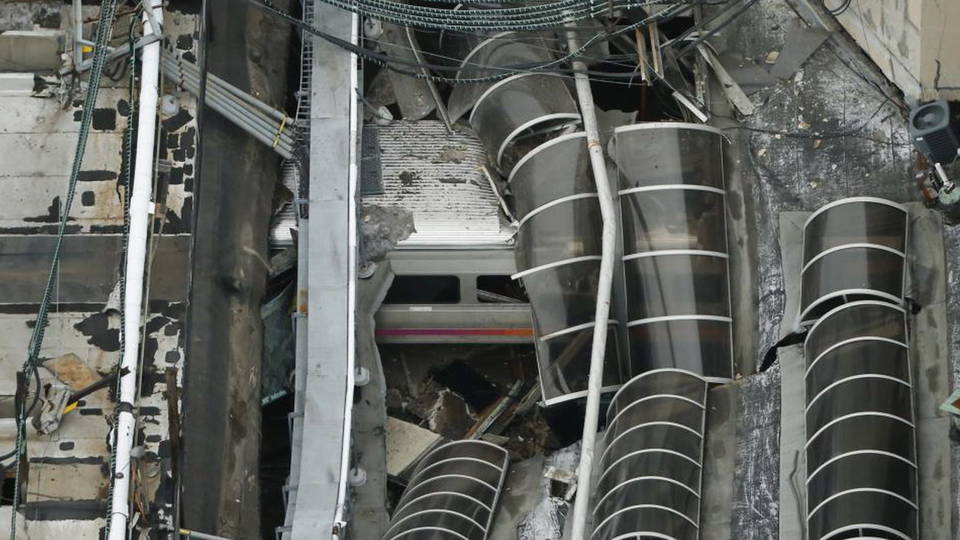 In Hoboken, New Jersey, at least one person was killed and more than 100 injured, many critically, after a commuter train hurtled through a station and crashed through a wall during the morning rush on Thursday. Witnesses described a horrific scene of bloodied bodies and twisted metal. Eyewitness William Blaine said the crash sounded like a bomb.
In Hoboken, New Jersey, at least one person was killed and more than 100 injured, many critically, after a commuter train hurtled through a station and crashed through a wall during the morning rush on Thursday. Witnesses described a horrific scene of bloodied bodies and twisted metal. Eyewitness William Blaine said the crash sounded like a bomb.
 In news of global warming, a new analysis by top climate scientists finds the Earth’s average temperature is on track to increase by 2 degrees Celsius––or 3.6 degrees Fahrenheit––by mid-century, unless governments take dramatic steps to limit greenhouse gas emissions. The study finds that current pledges to combat climate change under a U.N. agreement crafted in Paris last December fall far short of preventing a temperature rise of 1.5 degrees Celsius, one of the agreement’s goals. The study was led by the U.N.’s former top climate scientist, Robert Watson, who said governments need to double or triple their efforts to meet the Paris target.
In news of global warming, a new analysis by top climate scientists finds the Earth’s average temperature is on track to increase by 2 degrees Celsius––or 3.6 degrees Fahrenheit––by mid-century, unless governments take dramatic steps to limit greenhouse gas emissions. The study finds that current pledges to combat climate change under a U.N. agreement crafted in Paris last December fall far short of preventing a temperature rise of 1.5 degrees Celsius, one of the agreement’s goals. The study was led by the U.N.’s former top climate scientist, Robert Watson, who said governments need to double or triple their efforts to meet the Paris target.
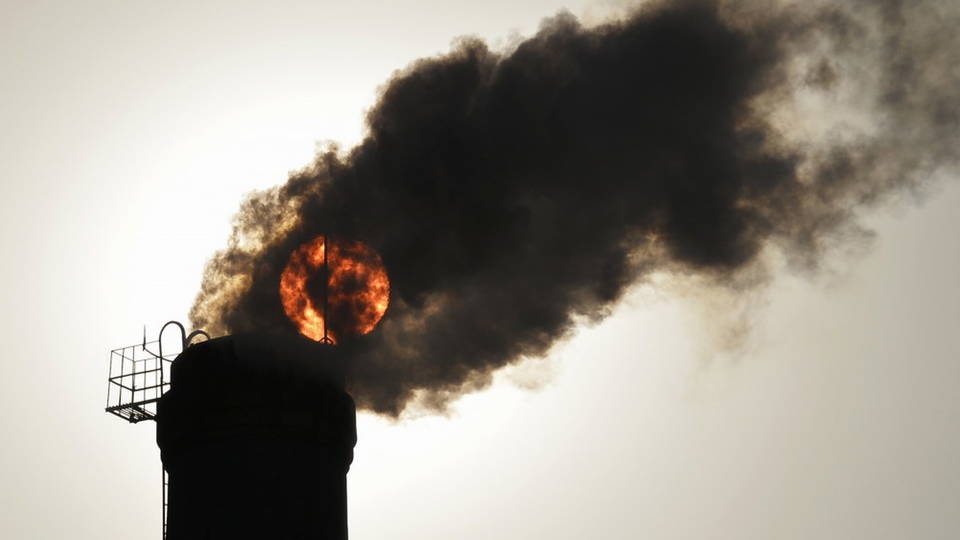 Meanwhile, the Mauna Loa Observatory in Hawaii reports atmospheric carbon dioxide levels have topped 400 parts per million throughout 2016 and are unlikely to fall below that level for the foreseeable future. That’s far above the 350 parts per million considered by many climate scientists to be the safe limit.
Meanwhile, the Mauna Loa Observatory in Hawaii reports atmospheric carbon dioxide levels have topped 400 parts per million throughout 2016 and are unlikely to fall below that level for the foreseeable future. That’s far above the 350 parts per million considered by many climate scientists to be the safe limit.
 In other climate-related news, a new federal lawsuit takes aim at ExxonMobil in what advocates say is the first legal action targeting the oil giant for its decades-long cover-up of climate change. The suit, by the environmental group Conservation Law Foundation, charges ExxonMobil continues to pollute the Island End and Mystic rivers near Boston, in part by failing to fortify a storage facility to withstand rising seas and extreme weather caused by climate change. Last year, InsideClimate News and the Los Angeles Times revealed that for decades, beginning in 1977, Exxon concealed its own findings that fossil fuels cause global warming, alter the climate and melt Arctic ice.
In other climate-related news, a new federal lawsuit takes aim at ExxonMobil in what advocates say is the first legal action targeting the oil giant for its decades-long cover-up of climate change. The suit, by the environmental group Conservation Law Foundation, charges ExxonMobil continues to pollute the Island End and Mystic rivers near Boston, in part by failing to fortify a storage facility to withstand rising seas and extreme weather caused by climate change. Last year, InsideClimate News and the Los Angeles Times revealed that for decades, beginning in 1977, Exxon concealed its own findings that fossil fuels cause global warming, alter the climate and melt Arctic ice.
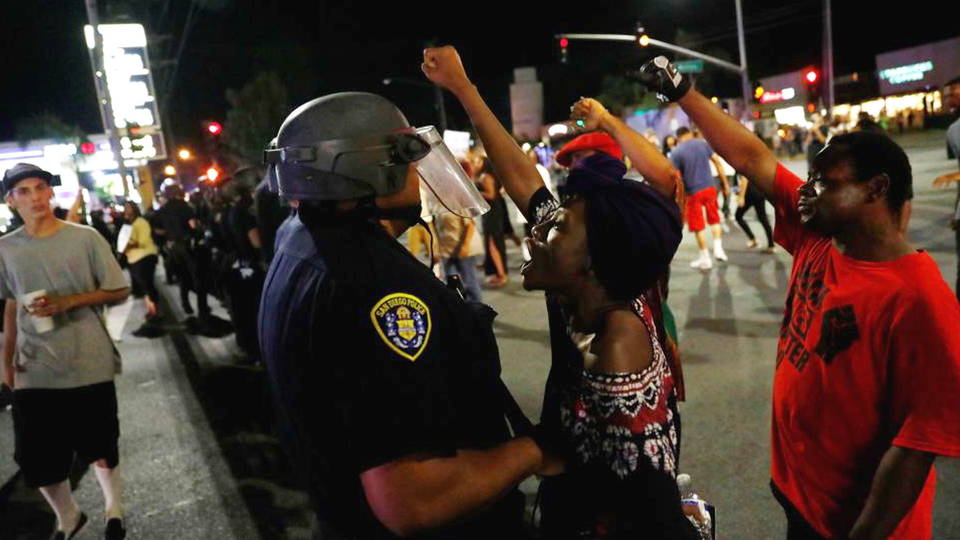 In the San Diego suburb of El Cajon, California, the family of Alfred Olango, a Ugandan refugee shot dead by police on Tuesday, is calling for peaceful protests and the release of a video showing the killing. Olango’s mother, Pamela Benge, said her son was distraught over the recent death of a friend and was having a mental breakdown on Tuesday when police confronted him. She says officers should have helped her son, but instead opened fire. Benge said her family arrived in the U.S. in 1991 as refugees seeking to escape violence.
In the San Diego suburb of El Cajon, California, the family of Alfred Olango, a Ugandan refugee shot dead by police on Tuesday, is calling for peaceful protests and the release of a video showing the killing. Olango’s mother, Pamela Benge, said her son was distraught over the recent death of a friend and was having a mental breakdown on Tuesday when police confronted him. She says officers should have helped her son, but instead opened fire. Benge said her family arrived in the U.S. in 1991 as refugees seeking to escape violence.
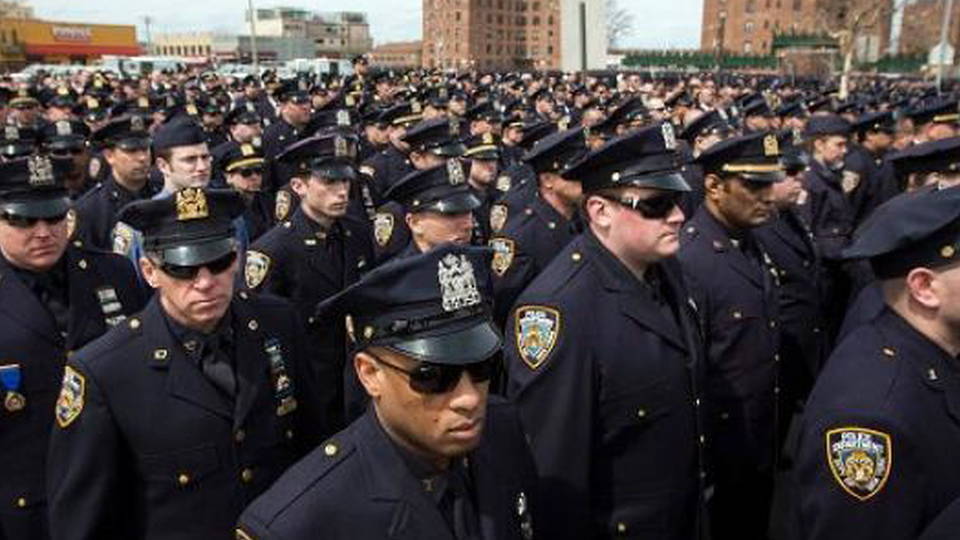 In New York, newly released court papers reveal the city’s police department has secretly recorded Black Lives Matter protesters since the death of Eric Garner in 2014, sending undercover officers to demonstrations. The disclosure came as the NYPD refused to make public videos, photos and other records requested under the Freedom of Information Act. Lawyers seeking the records say the surveillance could violate the First and Fourth Amendments. They say the NYPD may have also violated so-called Handschu guidelines, which bar the NYPD from spying on protesters for solely political reasons. In August of 2015, The Intercept reported that New York transit police also spied on Black Lives Matter protesters.
In New York, newly released court papers reveal the city’s police department has secretly recorded Black Lives Matter protesters since the death of Eric Garner in 2014, sending undercover officers to demonstrations. The disclosure came as the NYPD refused to make public videos, photos and other records requested under the Freedom of Information Act. Lawyers seeking the records say the surveillance could violate the First and Fourth Amendments. They say the NYPD may have also violated so-called Handschu guidelines, which bar the NYPD from spying on protesters for solely political reasons. In August of 2015, The Intercept reported that New York transit police also spied on Black Lives Matter protesters.
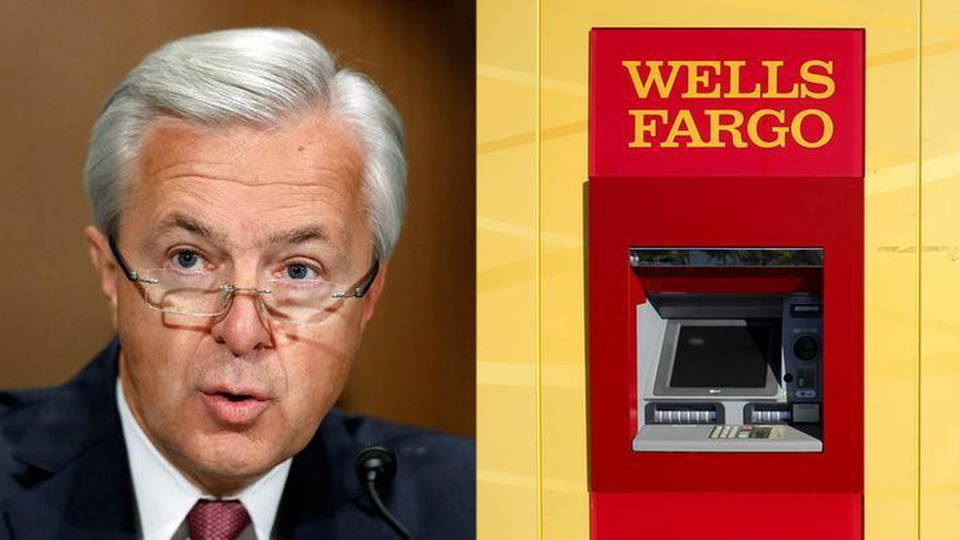 In financial news, the CEO of Wells Fargo was grilled by lawmakers on Capitol Hill on Thursday over a scandal that saw thousands of employees use private customer information to create 2 million fake accounts in order to meet sales targets. CEO John Stumpf apologized to the House Financial Services Committee and said his bank will eliminate sales quotas for employees beginning on October 1. Earlier this week, the bank took back $41 million in stock awarded to Stumpf. That did little to appease lawmakers, including New York Democratic Representative Carolyn Maloney, who noted Stumpf sold $13 million worth of Wells Fargo stock in 2013.
In financial news, the CEO of Wells Fargo was grilled by lawmakers on Capitol Hill on Thursday over a scandal that saw thousands of employees use private customer information to create 2 million fake accounts in order to meet sales targets. CEO John Stumpf apologized to the House Financial Services Committee and said his bank will eliminate sales quotas for employees beginning on October 1. Earlier this week, the bank took back $41 million in stock awarded to Stumpf. That did little to appease lawmakers, including New York Democratic Representative Carolyn Maloney, who noted Stumpf sold $13 million worth of Wells Fargo stock in 2013.
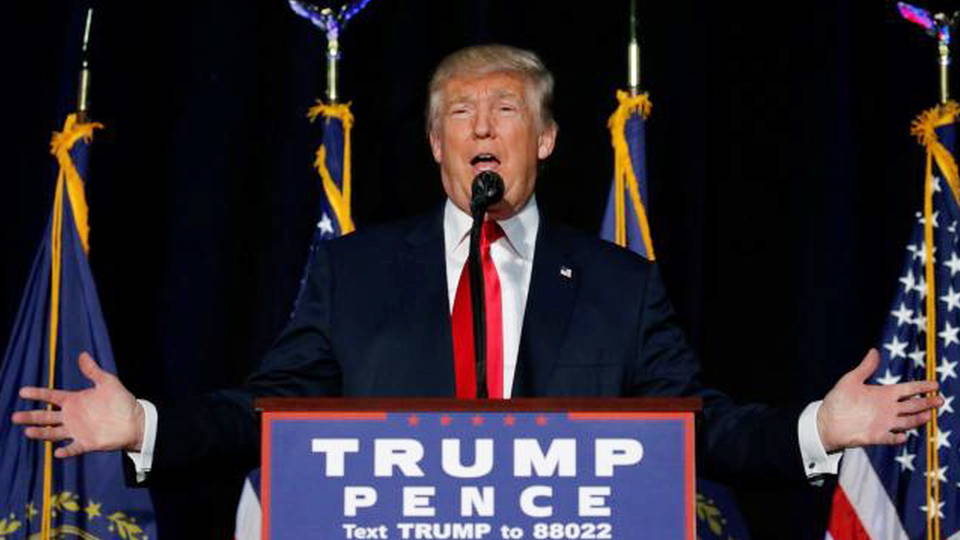 In news from the campaign trail, the editorial board of USA Today has declared Republican nominee Donald Trump unfit for the presidency. It’s the first time in its history that the country’s highest-circulation newspaper has taken sides in a presidential race. This is USAToday editorial page editor Bill Sternberg.
In news from the campaign trail, the editorial board of USA Today has declared Republican nominee Donald Trump unfit for the presidency. It’s the first time in its history that the country’s highest-circulation newspaper has taken sides in a presidential race. This is USAToday editorial page editor Bill Sternberg.
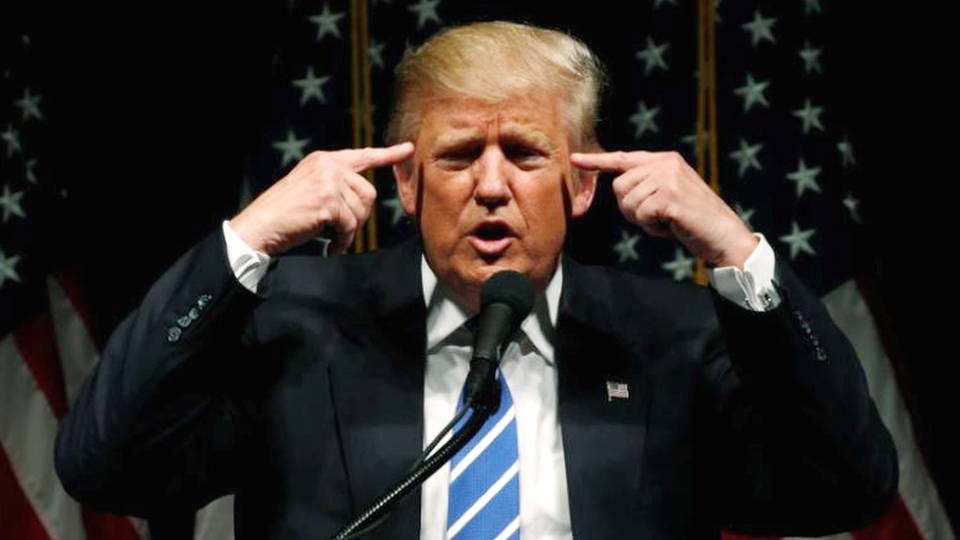 In other campaign news, Democratic nominee Hillary Clinton said Thursday that Donald Trump appeared to violate U.S. law by attempting to do business in Cuba. Clinton was referring to an investigation by Newsweek that revealed a Trump company violated the U.S. embargo against Cuba in 1998, spending at least $68,000 during a secret business trip to Havana. The investigation also reveals that Trump had knowledge of top executives working to cover up the illegal expenditures.
In other campaign news, Democratic nominee Hillary Clinton said Thursday that Donald Trump appeared to violate U.S. law by attempting to do business in Cuba. Clinton was referring to an investigation by Newsweek that revealed a Trump company violated the U.S. embargo against Cuba in 1998, spending at least $68,000 during a secret business trip to Havana. The investigation also reveals that Trump had knowledge of top executives working to cover up the illegal expenditures.
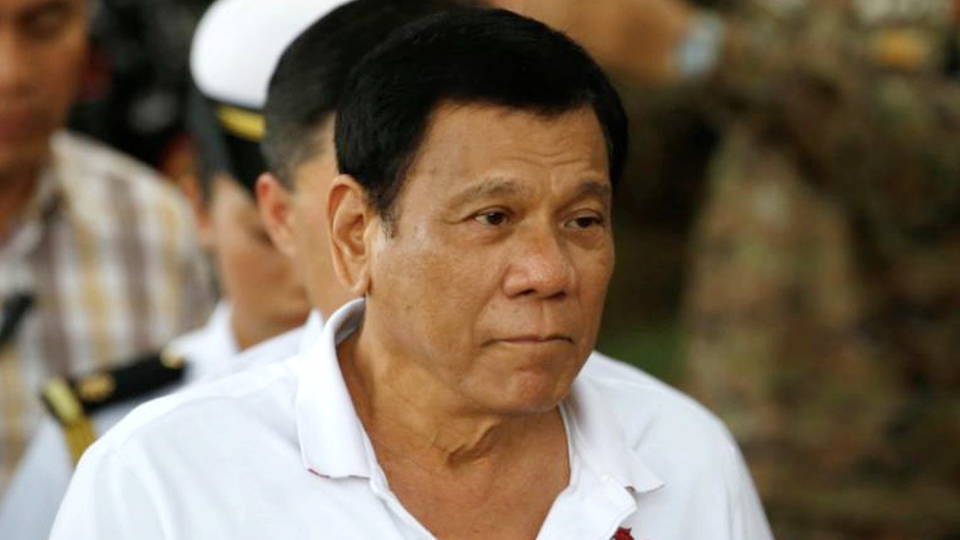 And in the Philippines, President Rodrigo Duterte said today he’d be happy to slaughter drug addicts just like Adolf Hitler massacred millions of Jews during the Holocaust. Duterte made the remarks during a rambling speech after returning from a trip to Vietnam.
-------
And in the Philippines, President Rodrigo Duterte said today he’d be happy to slaughter drug addicts just like Adolf Hitler massacred millions of Jews during the Holocaust. Duterte made the remarks during a rambling speech after returning from a trip to Vietnam.
-------
Donate today:
Follow:



SPECIAL BROADCAST
 In Syria, Russian and Syrian warplanes continued a heavy bombing campaign in Aleppo, while troops massed east of the city and the United Nations warned of a humanitarian catastrophe. At least 100,000 children remain trapped in the eastern part of Aleppo, where the U.N. says food is nearly exhausted for more than a quarter-million people. U.N. humanitarian chief Stephen O’Brien told the Security Council that Aleppo had descended into a "merciless abyss of humanitarian catastrophe.”
In Syria, Russian and Syrian warplanes continued a heavy bombing campaign in Aleppo, while troops massed east of the city and the United Nations warned of a humanitarian catastrophe. At least 100,000 children remain trapped in the eastern part of Aleppo, where the U.N. says food is nearly exhausted for more than a quarter-million people. U.N. humanitarian chief Stephen O’Brien told the Security Council that Aleppo had descended into a "merciless abyss of humanitarian catastrophe.”Stephen O’Brien: "The only remaining deterrent, it seems, is that there will be real accountability in the court of world opinion and disgust. Goodness knows, nothing else seems to be working to stop this deliberate, gratuitous carnage of lives lost and smashed."
A U.S.- and Russian-brokered ceasefire in early September began unraveling two weeks ago, after a U.S.-led airstrike killed dozens of Syrian troops in what officials called an accident. Russian diplomats on Thursday rejected a U.S. call for a seven-day pause in bombing to allow humanitarian aid into Aleppo, instead offering weekly 48-hour ceasefires. Secretary of State John Kerry said he was considering cutting off all talks with Russia over the crisis.
Secretary of State John Kerry: "No, I think we’re on the verge of suspending the discussion, because, you know, it’s irrational in the context of the kind of bombing taking place to be sitting there trying to take things seriously."
Meanwhile, Russian officials are condemning comments by U.S. State Department spokesperson John Kirby, who said this week that Russia’s bombing campaign could lead to terror attacks in Russian cities and Russian troops being shipped home in body bags. Kremlin spokesperson Dmitry Peskov said the statement amounted to U.S. support for terrorism.
India Evacuates Thousands After Strikes Kill Pakistani Soldiers in Kashmir
 In Kashmir, Pakistan is vowing to defend itself against what it calls Indian aggression, after two of its soldiers were killed in cross-border fighting Thursday. India says it launched "surgical strikes" against militants in the disputed "line of control" region between Indian- and Pakistani-controlled Kashmir. Pakistan’s prime minister called an emergency Cabinet meeting over the latest fighting, which comes less than two weeks after an attack on an Indian army base killed 18 soldiers. India has ordered the evacuation of thousands of people in villages near its border with Pakistan.
In Kashmir, Pakistan is vowing to defend itself against what it calls Indian aggression, after two of its soldiers were killed in cross-border fighting Thursday. India says it launched "surgical strikes" against militants in the disputed "line of control" region between Indian- and Pakistani-controlled Kashmir. Pakistan’s prime minister called an emergency Cabinet meeting over the latest fighting, which comes less than two weeks after an attack on an Indian army base killed 18 soldiers. India has ordered the evacuation of thousands of people in villages near its border with Pakistan.Israel: World Leaders Attend Funeral of Former PM Shimon Peres
 In Israel, world leaders gathered Friday for the funeral of former Prime Minister Shimon Peres, who died in Tel Aviv on Wednesday at the age of 93. Among those paying tribute was President Barack Obama.
In Israel, world leaders gathered Friday for the funeral of former Prime Minister Shimon Peres, who died in Tel Aviv on Wednesday at the age of 93. Among those paying tribute was President Barack Obama.President Barack Obama: "I don’t believe he was naïve, but he understood from hard-earned experience that true security comes through making peace with your neighbors. 'We won them all,' he said of Israel’s wars, 'but we did not win the greatest victory that we aspired to: release from the need to win victories.'"
Palestinian Authority President Mahmoud Abbas attended the funeral, where he briefly shook hands and exchanged words with Israeli Prime Minister Benjamin Netanyahu. In 1994, Peres won the Nobel Peace Prize for helping negotiate the Oslo Accords. He was prime minister in 1996 when Israeli forces shelled a refugee camp in Qana, Lebanon, killing 106 people and injuring 116 others. Peres was also a leading advocate for the building of Jewish settlements in the occupied West Bank and Gaza. His slogan was "Settlements everywhere."
New Jersey: Hoboken Train Crash Kills One and Injures Over 100
 In Hoboken, New Jersey, at least one person was killed and more than 100 injured, many critically, after a commuter train hurtled through a station and crashed through a wall during the morning rush on Thursday. Witnesses described a horrific scene of bloodied bodies and twisted metal. Eyewitness William Blaine said the crash sounded like a bomb.
In Hoboken, New Jersey, at least one person was killed and more than 100 injured, many critically, after a commuter train hurtled through a station and crashed through a wall during the morning rush on Thursday. Witnesses described a horrific scene of bloodied bodies and twisted metal. Eyewitness William Blaine said the crash sounded like a bomb.William Blaine: "So I ran out. When I looked to the right, I just saw bodies. And I saw debris, iron. And so I looked, and I saw dust in this guy’s hair. He tried to get up. I saw another person bleeding, and so I went to help them out, but a couple other people got to them first to help them. So I looked over, and that’s when I saw the train in the wall. It just blew my mind."
Officials are still investigating why the New Jersey Transit train failed to brake as it approached the Hoboken terminal, but they’re treating the disaster as an accident. The train did not have Positive Train Control, a technology that can automatically stop a train that is in danger of derailment or a collision. New Jersey Transit was supposed to have implemented the technology by the end of 2015 under a congressional mandate passed in 2008, but was granted a three-year extension after the railroad industry lobbied successfully for a delay.
Climate Scientists: Earth on Track for 2°C Temperature Rise by 2050
 In news of global warming, a new analysis by top climate scientists finds the Earth’s average temperature is on track to increase by 2 degrees Celsius––or 3.6 degrees Fahrenheit––by mid-century, unless governments take dramatic steps to limit greenhouse gas emissions. The study finds that current pledges to combat climate change under a U.N. agreement crafted in Paris last December fall far short of preventing a temperature rise of 1.5 degrees Celsius, one of the agreement’s goals. The study was led by the U.N.’s former top climate scientist, Robert Watson, who said governments need to double or triple their efforts to meet the Paris target.
In news of global warming, a new analysis by top climate scientists finds the Earth’s average temperature is on track to increase by 2 degrees Celsius––or 3.6 degrees Fahrenheit––by mid-century, unless governments take dramatic steps to limit greenhouse gas emissions. The study finds that current pledges to combat climate change under a U.N. agreement crafted in Paris last December fall far short of preventing a temperature rise of 1.5 degrees Celsius, one of the agreement’s goals. The study was led by the U.N.’s former top climate scientist, Robert Watson, who said governments need to double or triple their efforts to meet the Paris target.Earth’s Atmosphere Passes 400 Parts Per Million of Carbon Dioxide
 Meanwhile, the Mauna Loa Observatory in Hawaii reports atmospheric carbon dioxide levels have topped 400 parts per million throughout 2016 and are unlikely to fall below that level for the foreseeable future. That’s far above the 350 parts per million considered by many climate scientists to be the safe limit.
Meanwhile, the Mauna Loa Observatory in Hawaii reports atmospheric carbon dioxide levels have topped 400 parts per million throughout 2016 and are unlikely to fall below that level for the foreseeable future. That’s far above the 350 parts per million considered by many climate scientists to be the safe limit.ExxonMobil Lawsuit Cites Decades-Long Cover-Up of Climate Change
 In other climate-related news, a new federal lawsuit takes aim at ExxonMobil in what advocates say is the first legal action targeting the oil giant for its decades-long cover-up of climate change. The suit, by the environmental group Conservation Law Foundation, charges ExxonMobil continues to pollute the Island End and Mystic rivers near Boston, in part by failing to fortify a storage facility to withstand rising seas and extreme weather caused by climate change. Last year, InsideClimate News and the Los Angeles Times revealed that for decades, beginning in 1977, Exxon concealed its own findings that fossil fuels cause global warming, alter the climate and melt Arctic ice.
In other climate-related news, a new federal lawsuit takes aim at ExxonMobil in what advocates say is the first legal action targeting the oil giant for its decades-long cover-up of climate change. The suit, by the environmental group Conservation Law Foundation, charges ExxonMobil continues to pollute the Island End and Mystic rivers near Boston, in part by failing to fortify a storage facility to withstand rising seas and extreme weather caused by climate change. Last year, InsideClimate News and the Los Angeles Times revealed that for decades, beginning in 1977, Exxon concealed its own findings that fossil fuels cause global warming, alter the climate and melt Arctic ice.El Cajon, CA: Family of Unarmed Ugandan Refugee Killed by Police Calls for Protests, Video Release
 In the San Diego suburb of El Cajon, California, the family of Alfred Olango, a Ugandan refugee shot dead by police on Tuesday, is calling for peaceful protests and the release of a video showing the killing. Olango’s mother, Pamela Benge, said her son was distraught over the recent death of a friend and was having a mental breakdown on Tuesday when police confronted him. She says officers should have helped her son, but instead opened fire. Benge said her family arrived in the U.S. in 1991 as refugees seeking to escape violence.
In the San Diego suburb of El Cajon, California, the family of Alfred Olango, a Ugandan refugee shot dead by police on Tuesday, is calling for peaceful protests and the release of a video showing the killing. Olango’s mother, Pamela Benge, said her son was distraught over the recent death of a friend and was having a mental breakdown on Tuesday when police confronted him. She says officers should have helped her son, but instead opened fire. Benge said her family arrived in the U.S. in 1991 as refugees seeking to escape violence.Pamela Benge: "We have come from a war zone. We wanted protection. That’s why we’re here. I wanted the children not to be running around, being in fear every night, sleeping in the bush. And that’s why we’re here. Yes? Being a refugee, I know there are millions of refugees that are here, just seeking for a better place, a safety place. That’s all—safety. We wanted just to be safe. But now, I ask the question: Where should we go? I don’t know."
Olango’s family and supporters are demanding the release of a cellphone video recorded by a bystander that captured the killing.
New York: Undercover Officers Spied on Black Lives Matter Activists
 In New York, newly released court papers reveal the city’s police department has secretly recorded Black Lives Matter protesters since the death of Eric Garner in 2014, sending undercover officers to demonstrations. The disclosure came as the NYPD refused to make public videos, photos and other records requested under the Freedom of Information Act. Lawyers seeking the records say the surveillance could violate the First and Fourth Amendments. They say the NYPD may have also violated so-called Handschu guidelines, which bar the NYPD from spying on protesters for solely political reasons. In August of 2015, The Intercept reported that New York transit police also spied on Black Lives Matter protesters.
In New York, newly released court papers reveal the city’s police department has secretly recorded Black Lives Matter protesters since the death of Eric Garner in 2014, sending undercover officers to demonstrations. The disclosure came as the NYPD refused to make public videos, photos and other records requested under the Freedom of Information Act. Lawyers seeking the records say the surveillance could violate the First and Fourth Amendments. They say the NYPD may have also violated so-called Handschu guidelines, which bar the NYPD from spying on protesters for solely political reasons. In August of 2015, The Intercept reported that New York transit police also spied on Black Lives Matter protesters.Wells Fargo CEO Grilled at House Hearing over Fake Account Scandal
 In financial news, the CEO of Wells Fargo was grilled by lawmakers on Capitol Hill on Thursday over a scandal that saw thousands of employees use private customer information to create 2 million fake accounts in order to meet sales targets. CEO John Stumpf apologized to the House Financial Services Committee and said his bank will eliminate sales quotas for employees beginning on October 1. Earlier this week, the bank took back $41 million in stock awarded to Stumpf. That did little to appease lawmakers, including New York Democratic Representative Carolyn Maloney, who noted Stumpf sold $13 million worth of Wells Fargo stock in 2013.
In financial news, the CEO of Wells Fargo was grilled by lawmakers on Capitol Hill on Thursday over a scandal that saw thousands of employees use private customer information to create 2 million fake accounts in order to meet sales targets. CEO John Stumpf apologized to the House Financial Services Committee and said his bank will eliminate sales quotas for employees beginning on October 1. Earlier this week, the bank took back $41 million in stock awarded to Stumpf. That did little to appease lawmakers, including New York Democratic Representative Carolyn Maloney, who noted Stumpf sold $13 million worth of Wells Fargo stock in 2013.Rep. Carolyn Maloney: "So my question is: Did you dump $13 million of Wells Fargo stock, which you did through your family trust, right after you found out that your bank had been fraudulently opening hundreds of thousands of scam accounts, ripping off your customers?"
John Stumpf: "I sold those shares, and I sold them with proper approvals with no view about anything that was going on with sales practices or anything else."
Earlier this month, Stumpf appeared before the Senate Banking Committee, where Massachusetts Democrat Elizabeth Warren accused him of "gutless leadership" and said he should be criminally investigated.
USA Today Editorial Board: Donald Trump Unfit For Presidency
 In news from the campaign trail, the editorial board of USA Today has declared Republican nominee Donald Trump unfit for the presidency. It’s the first time in its history that the country’s highest-circulation newspaper has taken sides in a presidential race. This is USAToday editorial page editor Bill Sternberg.
In news from the campaign trail, the editorial board of USA Today has declared Republican nominee Donald Trump unfit for the presidency. It’s the first time in its history that the country’s highest-circulation newspaper has taken sides in a presidential race. This is USAToday editorial page editor Bill Sternberg.Bill Sternberg: "The unanimous consensus of the board is that he lacks the temperament, the knowledge, maturity, steadiness, that America needs in its president."
The USA Today editorial board wrote of Trump, "He is erratic. ... He is ill-equipped to be commander in chief. ... He traffics in prejudice. ... His business career is checkered. ... He isn’t leveling with the American people. ... He speaks recklessly. ... He has coarsened the national dialogue. ... He is a serial liar." USA Today has not endorsed Hillary Clinton or any other candidate.
Hillary Clinton: Donald Trump Apparently Broke Cuban Embargo
 In other campaign news, Democratic nominee Hillary Clinton said Thursday that Donald Trump appeared to violate U.S. law by attempting to do business in Cuba. Clinton was referring to an investigation by Newsweek that revealed a Trump company violated the U.S. embargo against Cuba in 1998, spending at least $68,000 during a secret business trip to Havana. The investigation also reveals that Trump had knowledge of top executives working to cover up the illegal expenditures.
In other campaign news, Democratic nominee Hillary Clinton said Thursday that Donald Trump appeared to violate U.S. law by attempting to do business in Cuba. Clinton was referring to an investigation by Newsweek that revealed a Trump company violated the U.S. embargo against Cuba in 1998, spending at least $68,000 during a secret business trip to Havana. The investigation also reveals that Trump had knowledge of top executives working to cover up the illegal expenditures.Philippines' Duterte Likens Himself to Hitler, "Happy to Slaughter" Millions of Drug Addicts
 And in the Philippines, President Rodrigo Duterte said today he’d be happy to slaughter drug addicts just like Adolf Hitler massacred millions of Jews during the Holocaust. Duterte made the remarks during a rambling speech after returning from a trip to Vietnam.
And in the Philippines, President Rodrigo Duterte said today he’d be happy to slaughter drug addicts just like Adolf Hitler massacred millions of Jews during the Holocaust. Duterte made the remarks during a rambling speech after returning from a trip to Vietnam.President Rodrigo Duterte: "Hitler massacred 3 million Jews. Now, there is 3 million—what is it? Three million drug addicts, there are. I’d be happy to slaughter them. At least if Germany had Hitler, the Philippines would have [me]. You know, my victims, I would like to be all criminals, to finish the problem of my country and save the next generation from perdition."
A wave of extrajudicial killings in the Philippines has claimed thousands of lives since Rodrigo Duterte became president in June. Duterte vowed during his campaign to crack down on drug users just like he did as the longtime mayor of the city of Davao, where his strongman tactics prompted Human Rights Watch to call him the "death squad mayor."
Donate today:
Follow:




SPECIAL BROADCAST

Dear Educator: TheDemocracy Now!Education Team invites you to bring your students to our live broadcast at our New York City studio.
NEW BOOK

Arlie Russell Hochschild on Strangers in Their Own Land: Anger and Mourning on the AmericaPart 2
WORK WITH DN!

Senior TV Producer
COLUMN

Solidarity From Solitary: The National Prison Strike
-------
Democracy Now! Daily Digest: A Daily Independent Global News Hour with Amy Goodman & Juan González for Thursday, September 29, 2016
democracynow.org
Stories:
 Protests Continue in San Diego After Police Kill Mentally Ill, Unarmed Ugandan Refugee Alfred Olango
Protests Continue in San Diego After Police Kill Mentally Ill, Unarmed Ugandan Refugee Alfred Olango
Protests continue in the San Diego, California, suburb of El Cajon, where police shot and killed an unarmed African-American man Tuesday after his sister called 911 to report her brother was having a mental health emergency. Eyewitnesses in El Cajon said 38-year-old Alfred Olango was holding his hands up when he was tased by one police officer and then fired upon five times by another officer. Olango was a 38-year-old father of two and a Ugandan refugee who moved to the San Diego area 20 years ago. On Wednesday, police confirmed Alfred Olango did not have a gun. The object he pointed at police was a three-inch-long silver e-cigarette. We speak to Olango family attorney Dan Gilleon and Christopher Rice-Wilson of Alliance San Diego.
TRANSCRIPT
This is a rush transcript. Copy may not be in its final form.
NERMEEN SHAIKH: Protests continue in the San Diego, California, suburb of El Cajon, where police shot and killed an unarmed African-American man Tuesday after his sister called 911 to report her brother was having a mental health emergency. Eyewitnesses in El Cajon said 38-year-old Alfred Olango was holding his hands up when he was tased by one police officer and then fired on five times by another officer. Olango was a 38-year-old father of two and a Ugandan refugee who moved to the San Diego area 20 years ago.
In a dramatic video posted to Facebook, a woman named Rumbie Mubaiwa begins filming moments after Olango is shot dead. In the background, Olango’s sister is heard crying over the death of her brother.
RUMBIE MUBAIWA: OK, so the police did it again, y’all. They shot another unarmed black person, as usual. And the lady is saying she called them for help, not to kill her brother. And they shot her brother.
AMY GOODMAN: In the video, Alfred Olango’s grieving sister is seen tearfully confronting police. She tells them, "I called you to help me, but you killed my brother."
OLANGO’S SISTER: Guys, why couldn’t you tase him? Why couldn’t you guys tase him? Why? Why? Why? Why? Why?
RUMBIE MUBAIWA: What’s his birthday, so they could find his information?
OLANGO’S SISTER: Why couldn’t you guys tase him? I told you he’s sick. And you guys shot him.
AMY GOODMAN: The sister of Alfred Olango can be heard in the video saying, quote, "I called three times for them to come help me. Nobody came. They said it’s not priority," end-quote. Police scanner audio at the time of the shooting reveals officers knew they were responding to a so-called 5150 call, or a mental health emergency. It does not appear that officers dispatched a Psychiatric Emergency Response Team. El Cajon Police Chief Jeff Davis acknowledged it took officers 50 minutes—that’s 5-0 minutes—to respond to the 911 call of Olango’s sister. He said there was no weapon found at the scene of the killing. Chief Davis disputed witness accounts that Olango had his hands in the air, saying the man pointed an object at an officer with both hands as if to fire a handgun.
POLICE CHIEF JEFF DAVIS: The male subject paced back and forth while the officers tried to talk to him. At one point, the male rapidly drew an object from his front pants pocket, placed both hands together on it and extended it rapidly towards the officer, taking what appeared to be a shooting stance, putting the object in the officer’s face. At this time, one of the officers with the Taser discharged his Taser in an effort to subdue the subject. Simultaneously, the officer who had the object pointed at him discharged his firearm, striking the male.
NERMEEN SHAIKH: On Wednesday, police confirmed Alfred Olango did not have a gun. The object he pointed at police was a three-inch-long silver e-cigarette. The shooting is just the most recent in a string of police shootings of primarily men of color with mental illness or disability. Just last week, police in Charlotte, North Carolina, shot and killed Keith Scott, a 43-year-old father of seven who reportedly had suffered a traumatic brain injury during a motorcycle accident in 2015. In July, a police officer in North Miami contends he mistakenly shot an African-American behavioral therapist, Charles Kinsey, when he was aiming for Arnaldo Rios Soto, a 26-year-old autistic man.
AMY GOODMAN: Who was simply cradling a toy truck.
In addition to concerns over the El Cajon Police Department’s response to what was a mental health crisis, questions are being raised about El Cajon police officer Richard Gonsalves, who’s been identified as the shooter, the officer who fatally shot Olango. Last year, Gonsalves was sued for sexual harassment after making lewd propositions and texting explicit photos, naked photos of his private parts, to his subordinate officer. He was demoted to officer from sergeant. Gonsalves was just served with a second suit in August of this year, after the harassment continued.
Well, for more, we’re joined by two guests. Dan Gilleon is the attorney for the family of Alfred Olango and also represents Officer Christine Greer, the plaintiff in the sexual harassment lawsuit against Gonsalves. Christopher Rice-Wilson is also with us, associate director at Alliance San Diego.
We welcome you both to Democracy Now! Dan Gilleon, let’s begin with you. Explain what took place—you are the lawyer for Alfred Olango’s family—how this happened, when the sister called and said her brother was having a mental health emergency. Explain what took place next.
DAN GILLEON: Well, you know, there’s a lot of facts that we just don’t know right now. And that’s one of the problems that I have with the way that the city of El Cajon and the police department is handling this. There is a video available. They took a still image from that video yesterday and put it out there in the media and began litigating this case in the media, but selecting the still image that helps them the most. So I don’t have a lot of the facts right now, and I don’t feel comfortable saying exactly what happened, because we just don’t know.
I can tell you this: When the police officers arrived on the scene, they knew that they were arriving in a situation that called for a PERT, a Psychiatric Emergency Response Team. They knew that. And they are trained on how to deal with people with mental illness. And one of the things that they know is that people with mental illnesses will act like people with mental illnesses. And the sister was clear with them that he was having a mental breakdown. He was having a mental breakdown. He had just lost someone very close to him. I do not know the effect of that recent loss on any other underlying situation or conditions of his, but they did know it. Even the chief police acknowledged that he was acting erratically and running in and out of traffic. So they knew that.
Instead of calling the PERT team, which was the team that’s designed to handle these situations and de-escalate these situations, they sent out this Richard Gonsalves, who, in my opinion, based upon the way he has behaved in the past, is a cowboy. He’s a cowboy that went out there and took matters into his own hands and, I believe, escalated the situation to the point where this mentally ill person acted like a mentally ill person and raised his hands towards him.
We don’t know if the officer with the laser deployed that—of Taser deployed that Taser first. We just don’t know that, because we don’t have the video. That would be an important thing to know. There was a comment by the chief of police that the firing officer—this would be Richard Gonsalves—that he fired simultaneously. Well, what we talk about in the business when we do police shooting cases is talk about sympathetic fire. And the police departments are taught how not to have situations like this result in a death as a result of sympathetic fire. And what happens is, oftentimes, when a Taser goes off, it creates a loud noise, and other officers who have their weapons drawn will fire, and not because any other reason other than they’ve just now heard another shot. We don’t know whether or not the officer who was firing the Taser followed protocol, which was to announce loudly "Taser, Taser, Taser" and then fire. We don’t know if he did that or not, because they won’t release that video. That process of announcing a Taser is very important, because it helps prevent the sympathetic fire.
Again, my role right now is to defend the case that’s being litigated in the media by the El Cajon Police Department. It’s a completely unfair thing to do, that less than 24 hours after this man dies, that the police department is cherry-picking one still image, releasing it to the media, all for the purpose of building their own case, which it boils down to: It was all his own fault. He had it coming. He shouldn’t have raised his hands. If he hadn’t raised his hands, he would be alive. I don’t believe the facts bear that scenario out all that well, but we just don’t know yet.
AMY GOODMAN: We’re going to go to break, then come back to this discussion. Dan Gilleon is the attorney for Alfred Olango’s family. Alfred Olango was a Ugandan refugee in El Cajon. Christopher Rice-Wilson, an activist, will talk about the protests that are taking place and what are the demands. And we’ll be speaking with John Snook, who is with Treatment Advocacy Center, about mentally ill people and how the police should deal with them. Stay with us.
[break]
AMY GOODMAN: "Gunshots" by Bambu, featuring Kiwi, here on Democracy Now!, democracynow.org, The War and Peace Report. I’m Amy Goodman, with Nermeen Shaikh.
NERMEEN SHAIKH: Protests continue in the San Diego, California, suburb of El Cajon, where police shot and killed an unarmed African-American man Tuesday after his sister called 911 to report her brother was having a mental health emergency. After Tuesday’s shooting, Alfred Olango’s sister explained the encounter with the police.
OLANGO’S SISTER: I called the 911 three times to come and help my brother, that he’s mentally perturbed and he needed help. And I thought they would send somebody to help him and get some crisis communication going on. The police officer, of course, came. He was running around, crossing the street. He almost got hit by the car. So I kind of tailgated him with my car and tried to get some help so they can take him to the hospital. When the police officer came, I told him, and they finally got him, tried to tell my brother, "Please, put your hands up. Don’t put your hands in your pocket. Listen." And I told the police, "Please don’t shoot him. He’s sick." I did not call the police officer to come and kill my brother.
NERMEEN SHAIKH: That was Alfred Olango’s sister talking about what happened when her brother was shot. We’re continuing our conversation now with Dan Gilleon, the attorney for Olango’s family, and Christopher Rice-Wilson. So, I’d like to ask Christopher Rice-Wilson about—could you say something about your response to the shooting?
CHRISTOPHER RICE-WILSON: Well, I’m—you know, I’m simply aghast at the actions taken that day by the El Cajon Police Department and continuing with the police chief’s press conference that, you know, revealed a still photo that made their case and presented Olango as a threat. The community is really upset right now, and we want justice for Alfred Olango. We want a transparent investigation. We don’t believe that we can get that here in San Diego, and we’re asking Attorney General Loretta Lynch to assign an investigator from the Department of Justice. The community is really upset right now. We are standing with the family, demanding justice, and hoping and praying that someone will come help us here in San Diego.
AMY GOODMAN: Can you talk about the history of police relations in San Diego?
CHRISTOPHER RICE-WILSON: Well, I mean, I think police relations with communities of color across this country are not very good right now. We see this happening across the country, so we don’t have to isolate it to San Diego. But when you talk about the El Cajon Police Department and its history with the community, there was a grand jury report about a year ago that recommended improvements in the El Cajon Police Department’s handling of the homeless and mentally ill, which have largely gone ignored. There is not a significant black population in El Cajon, and the black folks who do live in El Cajon often feel picked on by the police department, harassed by the police department. And so, when we see what happened the other day to Mr. Olango, it did not come as a surprise to many people, who said it was just a matter of time, prior to this event. ... Read More → California Cop Who Shot Unarmed Black Man Was Demoted in 2015 for Sexually Harassing Female Officer
California Cop Who Shot Unarmed Black Man Was Demoted in 2015 for Sexually Harassing Female Officer
The El Cajon police officer who shot Alfred Olango dead has been at the center of controversy before. Last year, Richard Gonsalves was sued for sexual harassment after making lewd propositions and texting explicit photos to his subordinate officer. He was demoted to officer from sergeant. Gonsalves was just served with a second suit in August of this year, after the harassment continued. Despite the lawsuits, Gonsalves remained on the force. We speak to Dan Gilleon, attorney for the family of Alfred Olango and Officer Christine Greer, the plaintiff in a sexual harassment lawsuit against Richard Gonsalves.
TRANSCRIPT
This is a rush transcript. Copy may not be in its final form.
AMY GOODMAN: Dan Gilleon, you not only represent the Alfred Olango family, after the police shooting death of Alfred Olango, you represent a plaintiff who sued Officer Gonsalves now twice. And, you know, in civilian life, we see this. We see, for example, in Omar Mateen and the Pulse shooting, the man who opened fire in the nightclub in Florida, the violence against women that precedes it, that perhaps is not taken seriously. Can you explain the story of your other plaintiff, the woman officer who says Gonsalves has been harassing her now for how long? And what has he been doing to her?
DAN GILLEON: Well, I represent Officer Christina Greer, and she’s a current police officer at the El Cajon Police Department. Now, I am a civil rights attorney, and civil rights includes sexual harassment. And I represent a lot of police officers themselves. And I—you know, I began suing police officers on civil rights cases, and then, a number of years ago, they began hiring me to go after the police departments themselves when they’ve been—their civil rights have been violated. And this is one of those cases, where Ms. Greer, Officer Greer, was facing some very severe sexual harassment by her own immediate supervisor, her sergeant. And that was Richard Gonsalves, the same officer now—he was demoted to an officer—that shot Mr. Olango.
He sent her a graphic, lewd photograph of his penis. And it was accompanied by text messages asking her for sexual acts, with her wife. She’s lesbian. It was over-the-top sexual harassment, something that would get anybody in this world, I would suspect, fired. But for whatever reason, the El Cajon Police Department decided to rally around, circle the wagons around, then-Sergeant Richard Gonsalves and just demote him down and then send him back to work with her, at which point he began continuing his harassment of her, spitting on her locker, following her down the hallway. Other officers would start making comments about her complaint about him, because they didn’t like that she violated the code of silence. It’s just a deplorable situation for Officer Greer.
And now this cowboy, who felt like he didn’t have to follow the rules that said you can’t send photographs of your penis to your subordinates, this same officer showed up at the scene of a mentally ill person who was, you know, acting out, and decided to take the law into his own hands there, too. And I think that this is just a problem for the El Cajon Police Department, because now, as you see again, circling the wagons, rallying behind this now officer and trying to act like he’s a victim again. And it’s really unfortunate.
And unfortunately, this is, seems like to me, the state of our affairs when it comes to police departments, even against their own. I represent a number of officers throughout San Diego County in many civil rights cases, where black officers, female officers are being discriminated against and really harassed at work because—either because of their protected class or because they complain about it. And we do have a problem here in San Diego, and there’s no doubt about that.
NERMEEN SHAIKH: Well, the details laid out in the lawsuit against Gonsalves are graphic. Part of the complaint addresses the city of El Cajon’s lack of action after the harassment took place. It reads, quote, "When a sergeant texts his female subordinate a graphic photograph of his penis and offers to be her (and her wife’s) 'f*** buddy,' that sergeant should be fired. He should be prosecuted. The City did neither." So, Dan Gilleon, can you talk about that and how common a response that is to similar harassment claims?
AMY GOODMAN: And what the settlement was.
DAN GILLEON: I’ve never seen this. I’ve done a lot of sexual harassment cases over the years; I’ve never seen this. I’ve never seen—there’s only one other occasion where I ever saw an employer send a photograph of himself, and he was not an employer anymore. He was quickly terminated. This is a case where it really violated the penal code; in other words, he violated criminal law. That’s why I was saying he should have been prosecuted. You can’t send a photograph of yourself to somebody else when they don’t want it.
AMY GOODMAN: So, Dan Gilleon, what was the—
DAN GILLEON: That’s just a basic law.
AMY GOODMAN: What was the settlement?
DAN GILLEON: Well, the settlement the first time, that was handled by another attorney, and they entered into a confidential settlement agreement, which I don’t believe is enforceable. I believe in First Amendment, but at this point I don’t want to violate an agreement that was entered into by another attorney. I took the case for Officer Greer after she returned to work and they began going after her again—I mean, harassing her again, and basically trying to punish her for the lawsuit in the first place.
AMY GOODMAN: She was forced to work with him when she returned?
DAN GILLEON: And again, there was despicable conduct against her.
AMY GOODMAN: She was forced to work with him when she returned?
DAN GILLEON: Right. I mean, even yesterday, she told me that she was there with him. The other day, she had to show up at another location doing work duties. He was sitting across from her, and she believed that he was videotaping her, just the way he was acting. This guy is over the top. And for this police department to be circling the wagons for this cowboy right now is—they’ve done it before, when he did something that should have gotten him terminated. He shouldn’t have been a police officer on Tuesday, when he shot and killed my client’s son, my client’s father, my client’s brother.
AMY GOODMAN: So, Christopher Rice—
DAN GILLEON: He shouldn’t even have been a police officer then.
AMY GOODMAN: Christopher Rice-Wilson of Alliance San Diego, what are you demanding now, as the protests continue?
CHRISTOPHER RICE-WILSON: We’re demanding that the police department release the video. We want to see the video. We don’t want a still screenshot that makes their case. We want to see what happened before and after. We want to see Mr. Olango’s actions that made him a threat. Witnesses reported he was holding a vape cigarette, before the police Department released that information. If witnesses 20 feet away could see it was a vape cigarette, why couldn’t the officers see it from five feet away?
NERMEEN SHAIKH: Well, I also want to bring into the—
CHRISTOPHER RICE-WILSON: One officer tased. The other officer fired a weapon. We want the video. ... Read More → Study: People with Mental Illness are 16 Times More Likely to Be Killed During a Police Encounter
Study: People with Mental Illness are 16 Times More Likely to Be Killed During a Police Encounter
The shooting of Alfred Olango in El Cajon, California, is just the most recent in a string of police shootings of primarily men of color with mental illness or disability. Just last week, police in Charlotte, North Carolina, shot and killed Keith Scott, a 43-year-old father of seven who reportedly had suffered a traumatic brain injury during a motorcycle accident in 2015. In July, a police officer in North Miami contends he mistakenly shot an African-American behavioral therapist, Charles Kinsey, when he was aiming for Arnaldo Rios Soto, a 26-year-old autistic man. We speak to John Snook, executive director of the Treatment Advocacy Center. He is co-author of a recent study that found people with mental illness are 16 times more likely to be killed during a police encounter than other civilians.
TRANSCRIPT
This is a rush transcript. Copy may not be in its final form.
NERMEEN SHAIKH: Well, I want to bring into this conversation John Snook, executive director of the Treatment Advocacy Center. He’s co-author of a recent study that found people with mental illness are 16 times more likely to be killed during a police encounter than other civilians. The report is titled "Overlooked in the Undercounted: The Role of Mental Illness in Fatal Law Enforcement Encounters."
John Snook, welcome to Democracy Now! So can you talk about what happened to Olango in the context of what your report found, the way in which police respond to emergency calls having to do with the mentally ill?
JOHN SNOOK: Sure. This is really the nightmare scenario for families with a loved one who has a mental illness, and for law enforcement themselves. These are the sort of situations that we really work every day to prevent. Unfortunately, this seems to have ended in the worst-case scenario. And as we’ve seen around the country with the data, it happens far too often.
And I think one of the things we need to think about is this idea of: When someone is having a medical emergency, why are we requiring law enforcement to step in? Why don’t we have a mental health system that addresses these folks before these situations happen? And again, we don’t want to be in a situation where we’re having to say, "Law enforcement, you need to address this person’s needs," because they aren’t mental health professionals. They haven’t been trained.
And San Diego has stepped in with a program that’s called PERT. It provides basically for a co-responder, who is a psychiatric professional, to come along on some of these calls. But obviously that didn’t happen in this case, and it can’t happen in every case. So we really need to step back and say, "How do we keep law enforcement from having to be on the front lines to be our mental health responders?" and say, "How do we get mental health professionals more involved in these cases?"
AMY GOODMAN: What’s so frightening here is it sounds like Mr. Olango’s sister did everything right. She called up. She said her brother was having a mental health emergency. She called several times. Not only did they send the police, but they waited 50 minutes. Now, if someone wants to report a mental health emergency, which could save other people, what kind of message is sent when you do this and you simply—basically, the message is sent: If you call to help the mentally ill, we will kill you, or we will kill them.
JOHN SNOOK: Well, I think it’s important to step back. And if you think about mental illness like any other illness, and you said, "This person was having a heart attack. Let’s call the police," we wouldn’t be surprised that bad outcomes happen, because that’s simply not what a police officer is there for. What we need to do is get away from this situation where we wait until someone is in a crisis before we provide care.
I think California has taken some steps, but even as we’ve been talking about this, there’s been a broad discussion in California about misuse of the Prop 63 funds, which are funds that ostensibly were to be provided to mental health. And the Little Hoover Commission just put out another report that said, unfortunately, those funds aren’t being used for mental health in the way that they should be. The tracking isn’t there.
And that’s what we’re talking about, is these situations, we have far too many people ending up not getting care until they’re in a crisis, and then we wonder why bad outcomes happen. And, unfortunately, that’s the case across the country. We simply have too many people in crisis, law enforcement trying to do their best in the worst-case scenarios, and that’s when these sort of tragedies occur.
AMY GOODMAN: We are now talking about, according to the figures in Mapping Police Violence, Mr. Olango became the 217th black American to be killed by police so far this year. Ultimately, John Snook, the most important recommendation you have at this point, as we see what happened from El Cajon to Tulsa to Charlotte?
JOHN SNOOK: I think it’s quite simple: We have to take mental illness seriously. Before this year, we basically weren’t even able to really provide a very effective number of how many people with mental illness were killed by law enforcement officers. We know, across the country, that people with a mental illness are languishing in jails and emergency rooms, because we simply don’t have enough hospital beds for them. We simply aren’t taking mental illness seriously.
Finally, we’re starting to see some movement. There’s a bill on the Hill that’s waiting for Senate action that would address these sorts of incidents, these issues with the most severely mentally ill, provide additional funding for police training, provide care for folks before they get to this point. Unfortunately, that’s still sitting in Congress. That’s the sort of thing that we need done. We need to have people recognize that this is a crisis that our nation is facing, and, unless we do more, we’re going to keep having these sort of incidents happen.
AMY GOODMAN: John Snook, we want to thank you for being with us, of the Treatment Advocacy Center, joining us from Washington. Dan Gilleon, attorney for the family of Alfred Olango, the unarmed African-American man who was shot and killed Tuesday by the El Cajon police just outside San Diego, Dan also representing the officer Christine Greer, the plaintiff in a sexual harassment lawsuit against Richard Gonsalves, the officer who killed Mr. Olango. And thank you so much to Christopher Rice-Wilson, associate director at Alliance San Diego.
This is Democracy Now! When we come back, we’re going to talk about Syria, what is taking place there, what needs to be happen—what needs to be happening. Back in a minute. ... Read More →
The Obama administration is threatening to cut off diplomatic talks with Russia on Syria in the wake of a devastating bombing campaign by the Syrian government and Russia in the city of Aleppo. On Wednesday, the two largest hospitals in East Aleppo were forced to close after being hit by airstrikes. The Russian-backed bombing of Aleppo intensified after a ceasefire collapsed 10 days ago. U.N. Secretary-General Ban Ki-moon says that the situation in the Syrian city of Aleppo has become worse than a slaughterhouse. We speak to Syrian activist Osama Nassar in East Ghouta, a suburb of Damascus, and Yasser Munif, a Syrian scholar at Emerson College who specializes in grassroots movements in Syria.
TRANSCRIPT
This is a rush transcript. Copy may not be in its final form.
NERMEEN SHAIKH: The Obama administration is threatening to cut off diplomatic talks with Russia on Syria in the wake of a devastating bombing campaign by the Syrian government and Russia in the city of Aleppo. On Wednesday, the two largest hospitals in East Aleppo were forced to close after being hit by airstrikes. There are reportedly only about 30 doctors left in East Aleppo, where 250,000 people are currently trapped. The Russian-backed bombing of Aleppo intensified after a ceasefire collapsed 10 days ago. Witnesses have described it as the worst assault in the five-year civil war. U.N. Secretary-General Ban Ki-moon says that the situation in the Syrian city of Aleppo has become worse than a slaughterhouse.
SECRETARY-GENERAL BAN KI-MOON: This morning, we awoke to reports of strikes on two more hospitals in Aleppo. Let us be clear: Those using ever more destructive weapons know exactly what they are doing. They know they are committing war crimes. Imagine the destruction, people with their limbs blown—blown off, children in a terrible pain with no relief, infected, suffering, dying, with nowhere to go and no end in sight. Imagine a slaughterhouse. This is worse. Even a slaughterhouse is more humane. Hospitals, clinics, ambulances and medical staff in Aleppo are under attack around the clock. According to Physicians for Human Rights, 95 percent of medical personnel who were in Aleppo before the war have fled, been detained or killed. This is a war against Syria’s health workers.
AMY GOODMAN: Video footage from Aleppo has emerged showing Syrian Civil Defense forces digging a young girl out from under the rubble. Five-year-old Ghazal Qasim was reportedly the sole survivor from an airstrike that killed 24 people in the Aleppo neighborhood al-Shaar. Her entire family, including four siblings, were reportedly killed in the bombing. According to aid groups, children in Aleppo have made up a large proportion of the casualties from the bombings. At least 100,000 children remain trapped in the eastern part of Aleppo.
Meanwhile, Human Rights Watch has accused Syrian government forces of using toxic chemicals in two recent attacks in Aleppo that killed five civilians and injured dozens. The group also said new information has emerged indicating the self-proclaimed Islamic State, or Daesh, has recently used chemicals as a weapon inside Syria.
On Wednesday, President Obama addressed the crisis in Syria during a town hall meeting on CNN.
PRESIDENT BARACK OBAMA: The key in Syria at this point is, unless we can get the parties involved to recognize that they are just burning their country to the ground, and get it on a diplomatic and political track, frankly, there’s going to be a limit to what we can do. We will try to mitigate the pain and suffering that those folks are undergoing. This is part of the reason why our approach to refugees, for example, has to be open-hearted—although also hardheaded to protect our homeland. But at the end of the day, there are going to be challenges around the world that happen that don’t directly touch on our security, where we need to help, we need to help lead, but just sending in more troops is not going to be the answer.
AMY GOODMAN: To talk more about Syria, we’re joined by Osama Nassar, an activist in East Ghouta, a suburb of Damascus, an area controlled by the opposition forces. Can you tell us what’s happening on the ground right now, Osama?
OSAMA NASSAR: Good morning. Actually, you know that all the cameras and all the media is now fixing on Aleppo, this city that are being attacked by the Russian airstrikes and the regime, the Syrian regime forces, and that maybe the American people and all—maybe most the West know nothing about our cause. They only know that there is, you know, ISIS, and there is people who are fighting for some reason or for no reason. You know that the regime has blacked out all the independent media in here, and he is only the only media who are allowed to go there and there.
Actually, people are really upset about what Mr. Obama said, what Mr. Obama does, actually, every now and then. The U.S. administration did nothing for to stop this ongoing slaughter in Syria. And it became really complicated, year after year, and even day after day. You know that a couple of—you know, today is the first anniversary of the Russian intervention in Syria. So, this means that one year ago, if the U.S. did something about Syria, they had nothing to—I mean, they were not obliged to do these marathon negotiations with the Russians. Two years ago, there were no, for example, bombing in the European country and in other places rather than Syria and Iraq. Three years ago, there were even no ISIS. Four years ago, there was no—there was no Jabhat al-Nusra. Five years ago, there were only people who are seeking freedom and dignity and demonstrating very peacefully in the street. So the more you delay or the more the U.S. and the international community are late to do something to stop this ongoing massacre in Syria, the more it’s become—
AMY GOODMAN: I’d like to bring Yasser Munif into the conversation, a professor at Emerson College who specializes in grassroots movements in Syria. He’s made several trips there, most recently in 2015, when he visited the Syrian-Turkish border. He’s a sociology professor at Emerson College. Yasser, could you talk about why you think the recent ceasefire between—that was negotiated between the U.S. and Russia in Syria collapsed?
YASSER MUNIF: Thank you for having me.
I think the main reason for the collapse of the ceasefire is, initially, the deal between the U.S. and Russia was not political. It was really only focusing on the military aspect of the conflict. And for the Russians, what was essential and important was basically maintaining the Syrian regime and making sure that the boundaries between the jihadist groups and the moderate military groups are blurred, and pushing most of the moderate groups into an alliance with al-Qaeda and other jihadist groups. For the—for the U.S., the goal of that deal was basically to collaborate and coordinate the strikes against ISIS. And in the end, the Syrian opposition or the Syrian population didn’t get anything, and the deal was basically offering to the Russian that they could maintain the Syrian despot.
So, there was total refusal and rejection of the deal by the Syrian population for obvious reasons, and it was basically reducing their revolution into a humanitarian conflict that would basically lead to opening a few corridors here and there and that some of the aid would reach the besieged areas in Aleppo and so on. But in the end, it was really benefiting the Syrian regime, not any of the opposition. And despite that—
NERMEEN SHAIKH: Well, I want to turn—Yasser, I want to turn to comments made by the U.N. special envoy for Syria, Staffan de Mistura. In an interview with Al Jazeera’s Mehdi Hasan on Saturday, he explained why he thought the recent ceasefire collapsed.
STAFFAN DE MISTURA: Who do you think would not agree, would not agree with the fact that the Syrian air force needs to be grounded? Well, obviously, President Assad is clearly not happy about it; otherwise, he would have been not able to do what he’s been claiming publicly to do, in Darayya and elsewhere, to reconquer the whole Syria territory. And to do so, he needs the air force.
On the other side, put yourself in the place of the armed opposition and their sponsors. Do they really find it easy for them, or do they like the idea of disconnecting from al-Nusra, which, in their view, has been one of the biggest fighters against Assad, but at the same time everybody recognizes, including U.N., is al-Qaeda, regardless whether they change their name? Then you would have an answer: who has no, at the moment, keen interest in making the deal working.
NERMEEN SHAIKH: Yasser Munif, can you comment on what the U.N. envoy for Syria said, and in particular the point he makes about Jabhat al-Nusra and their working with opposition forces in Syria?
YASSER MUNIF: [inaudible] the level and the scale of the violence against the Syrian population in Syria is basically due—it’s because of the monumental resilience and resistance of the Syrian population. We have to remember that the Syrian revolution has been going for five years, and it has many, many enemies, including the U.S. and Russia and Iran and Hezbollah and Turkey and Saudi Arabia and so on and so forth. And all these different forces, for different reasons, are trying to crush the Syrian revolution. The Syrian regime has been, since the beginning, trying to crush the secular and the progressive dimension of the revolution, and pushed the jihadists and empowered them and released them from prison, and they have become what they are today. And the Russian also are trying to basically break that kind of difference or differentiation between the moderate and the secular, to a certain extent, and the jihadist groups. And by using that type of violence and massacring the population, slaughtering people in Aleppo, it’s pushing the moderate groups and al-Qaeda to basically form an alliance, and, as such, pushing the West to basically choose the lesser evil, and that lesser evil being the Syrian regime as opposed to al-Qaeda and ISIS.
And even the U.N. played a very detrimental role in the Syrian conflict. I mean, the reports that show how the U.N. has been helping and dropping aid to the besieged city of Deir ez-Zor, which is under the control of the Syrian regime, but never dropping aid to any of the areas controlled by the opposition, or some of the funding that reached the Syrian military that was sent by the U.N. and so on. So the role of the U.N. is really detrimental. De Mistura is basically and clearly biased toward the Syrian regime.
AMY GOODMAN: I wanted to ask you about a comment that Syrian President Bashar al-Assad said in an interview last week on AP, the Syrian president denying government forces are besieging the rebel-held areas of Aleppo.
PRESIDENT BASHAR AL-ASSAD: If there’s really besiege—or siege around the city of Aleppo, people would have been dead by now. This is the second—more importantly, they have been shelling the neighboring areas and the position of the Syrian army for years, nonstop, nonstop shelling of mortars and different kind of little bombs. How could they be starving while at the same time they can have armament? How can we prevent the foods and the medical aid from reaching that area, and we cannot stop the armament from reaching that area? ...
They accuse Syria of attacking hospitals. So you have hospitals, and you have doctors, and you have everything. How could you have them? How could you have armament? That’s the question. How can you get armament to your people, if you claim that you have people in the grassroots, while you don’t have food? They have to explain. I don’t have to explain. The reality is telling.
AMY GOODMAN: That’s the Syrian president, Bashar al-Assad. Yasser Munif, can you respond?
YASSER MUNIF: So, the Syrian regime, very early, understood the importance of the media and creating a discourse, in addition to what’s happening on the ground, the military aspect of the conflict. And it was able, unfortunately, to create a parallel reality and create a media apparatus and information, propaganda, that is relayed by a number of different network, including RT, the Russian TV, but also a number of different websites and news outlets here in the U.S.—for example, Mint media and CounterPunch and others, who are basically repeating such silly things. I mean, anyone can verify and see that there is a siege around Aleppo. It’s not very difficult to do. If journalists wanted really to talk to people on the ground and interview them and get their views, it would be very easy. But the Syrian regime basically understands that and is using the media and that type of discourse as a weapon against the revolution, basically trying to confuse the different audiences and telling them that there are different truths, there are biases, we’re not sure—basically, creating confusion and challenging what’s happening on the ground.
NERMEEN SHAIKH: Well, today, The Intercept obtained—yesterday, obtained internal U.N. emails that revealed also that U.S. and European sanctions are having an extremely detrimental effect on ordinary Syrians and making access to aid supplies more difficult. Yasser Munif, could you respond to that?
YASSER MUNIF: Sure. I mean, this is also another aspect. The Syrian regime is using all weapons that are available for it to use, including besieging entire areas, starving the population, using bunker-busters bombs with the aid of the Russian, torturing the population, preventing water from reaching certain areas, and so on and so forth. And, unfortunately, I mean, the sanctions, as we know from previous experience with Iraq and so on, affect, for the most part, the civilian population. And that’s another example of how the Syrian population is basically surrounded and besieged in so many different ways.
I also wanted to mention that, as your previous guest mentioned earlier, that today we are witnessing or celebrating the first anniversary of the Russian intervention. And we are organizing a number of revolts in more than 30 different cities around the world on October 1st to basically raise awareness and tell people what’s happening. There will be revolts, protests, rallies, sit-ins, to basically try to break the siege around the Syrian revolution and tell people that the narrative that they’re hearing about the civilian war and the intervention and so on are a part what is happening. The other part is the resilience of the Syrian population, its resistance, and the ongoing Syrian revolution with its creative dimension and what people are doing within different—in many a different ways.
AMY GOODMAN: Yasser Munif, we want to thank you for being with us, Syrian scholar, professor at Emerson College in Boston, and Osama Nassar, speaking to us from East Ghouta, Syria. We’re going to continue this conversation and post it online at democracynow.org. ... Read More →
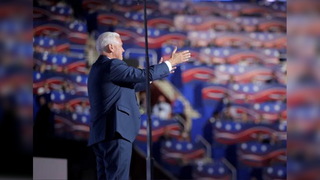 As Indiana Governor Mike Pence accepts the Republican nomination for vice president, we look at how the religious right will respond to the man who was their "dream candidate" in 2012. "In one fell swoop, he strengthens his connections to religious right leaders and to the Koch brothers’ network," says our guest Peter Montgomery, senior fellow at People for the American Way.
As Indiana Governor Mike Pence accepts the Republican nomination for vice president, we look at how the religious right will respond to the man who was their "dream candidate" in 2012. "In one fell swoop, he strengthens his connections to religious right leaders and to the Koch brothers’ network," says our guest Peter Montgomery, senior fellow at People for the American Way.
Did Donald Trump Pick Mike Pence to Appease the Koch Brothers & the Religious Right?
 As Indiana Governor Mike Pence accepts the Republican nomination for vice president, we look at how the religious right will respond to the man who was their "dream candidate" in 2012. "In one fell swoop, he strengthens his connections to religious right leaders and to the Koch brothers’ network," says our guest Peter Montgomery, senior fellow at People for the American Way.
As Indiana Governor Mike Pence accepts the Republican nomination for vice president, we look at how the religious right will respond to the man who was their "dream candidate" in 2012. "In one fell swoop, he strengthens his connections to religious right leaders and to the Koch brothers’ network," says our guest Peter Montgomery, senior fellow at People for the American Way.TRANSCRIPT
This is a rush transcript. Copy may not be in its final form.
AMY GOODMAN: This is Democracy Now!, democracynow.org. This is "Breaking with Convention: War, Peace and the Presidency." We’re in Cleveland, Ohio, covering the Republican National Convention inside and out, from the streets to the corporate suites to the convention floor. I’m Amy Goodman. On Wednesday night, Indiana Governor Mike Pence accepted the Republican nomination for vice president.
GOV. MIKE PENCE: As this election approaches, every American should know that while we’re filling the presidency for the next four years, this election will define the Supreme Court for the next 40. We all better think very carefully, very carefully, about what this means for our Constitution and limited government. Elect Hillary Clinton, and you better get used to being subject to unelected judges using unaccountable power to take unconstitutional actions. Though let me say, for the sake of rule of law, for the sake of the sanctity of life, for the sake of our Second Amendment, and for the sake of all our other God-given liberties, we must ensure that the next president appointing justices to the Supreme Court is Donald Trump.
AMY GOODMAN: But Governor Pence’s speech Wednesday night was largely overshadowed by Texas Senator Ted Cruz, who refused to endorse Donald Trump in a stunning 21-minute prime-time address that was greeted by boos from Trump supporters.
SEN. TED CRUZ: If you love our country and love your children as much as I know that you do, stand and speak and vote your conscience. Vote for candidates up and down the ticket who you trust to defend our freedom and to be faithful to the Constitution.
AMY GOODMAN: To talk more about the Republican National Convention, we’re joined now by Peter Montgomery, senior fellow at People for the American Way. His recent pieceis headlined "How Would Religious Right Respond to Pence as VP?"
Peter Montgomery, welcome to Democracy Now! So, how are they responding?
PETER MONTGOMERY: Most of them are responding very strongly. They—he’s been a longtime champion of their issues, and, for the most part, they’re very happy with him. When he was a member of Congress before he decided to run for the governorship, he was really seen as their dream candidate in 2012, and he won the straw poll at the religious right Values Voters Summit. And one of the religious broadcasters was comparing him to Madonna. So, they’ve had some disputes with him since he became governor, but, for the most part, they’re pretty happy with him.
AMY GOODMAN: Talk about Donald Trump’s selection of Pence as his running mate. Now, we have learned, since his selection, that he actually had chosen John Kasich, the governor here of Ohio, who hasn’t shown up for this convention, though he was at the Rock and Roll Hall of Fame down the street in Cleveland. Now, the Trump campaign is denying this, but it’s been very—it’s been reported in detail that Donald Trump Jr. approached the Trump campaign—approached Kasich and said that he would be in charge of both domestic and foreign policy. And The New York Times reports that Kasich directly spoke to Donald Trump and said no, that he would not accept this. So, it’s Donald—so it is Governor Pence. Talk about why you think Donald Trump chose him?
PETER MONTGOMERY: Well, I think he probably chose Mike Pence because Mike Pence is close to both the Koch brothers’ political network and to the religious right. And those are two hugely important parts of the Republican infrastructure that have not been uniformly excited about Trump. And some of them have been very concerned about him. So, in one fell swoop, he strengthens his connections to religious right leaders and to the Koch brothers’ network. And he gets someone who comes across as a stable person, when people are concerned about his—you know, of Trump’s temperament.
AMY GOODMAN: Talk about the event you attended on Tuesday night, the American Conservative Union Federation.
PETER MONTGOMERY: Yeah, the American Conservative Union had a panel discussion—
AMY GOODMAN: Foundation.
PETER MONTGOMERY: —asking whether people would be—whether conservatives will be supporting Trump. And Pence showed up as a surprise keynoter, telling conservatives that the primaries were over, it’s time to get in line and support him, and also trying to convince [them] that Trump is a good man. He used that phrase multiple times in his short speech to them. "This good man" was something that he was really trying to convince the conservatives there about.
AMY GOODMAN: Explain Governor Pence’s involvement with what’s called the Religious Freedom Restoration Act, seen as a fiercely anti-LGBTQ law, that he signed off on and then was forced to, quote, "clarify."
PETER MONTGOMERY: Right. This was a law that he—was passed and he signed last spring. It’s an effort by religious right groups around the country to pass these state laws that would really give special legal protection to anti-LGBT discrimination, would allow business owners and others to claim a religious exemption from nondiscrimination laws. And he signed it with a lot of religious leaders around him, and they were very happy. But there was huge backlash, led by the business community, that I think really stunned Pence. And he was forced to sign an amendment to that law that said it can’t be used to discriminate. And many of his religious right allies saw that as a huge betrayal. He was caught between his allies in the business community and his allies in the religious right. And so, some people, like Tony Perkins at the Family Research Council, are still a little bitter about that. He said the other day, when talking about Trump’s choice of Pence, that he gives Trump credit for trying and wanting to reach out, but he’s still not too happy with Pence on that.
AMY GOODMAN: He got tremendous both corporate backlash, everyone from Angie’s List to Apple, to the athletic leagues like the NCAA, all saying that they would leave Indiana, they would boycott Indiana.
PETER MONTGOMERY: And I think he was absolutely unprepared for that. I think, you know, his—the circles that he travels in, the culture that he—you know, he’s been part of these anti-gay circles for so long, I think he didn’t realize how much the business community has moved, the way the public has moved on LGBT issues. And I think he really was not prepared for that kind of business backlash to supporting pro-discrimination legislation.
AMY GOODMAN: You’ve been tracking hate speech here at the RNC. Peter Montgomery, talk about it.
PETER MONTGOMERY: Well, you know, I think that there has been a tremendous amount of rhetoric on the floor that’s been disturbing to people, misogynist, you know, the way people have been referring to Hillary Clinton. There have been a lot of attacks, both on the floor and at some of the right-wing gatherings that have been taking place—attacks on the Black Lives Matter activists, attacks on immigration. It’s really been a disturbing show.
AMY GOODMAN: And the Gays for Trump party that you attended last night?
PETER MONTGOMERY: That was one of the stranger things I think I have experienced. It was organized by a group called Gays for Trump, and the focus of it was to highlight some very hardcore, extreme anti-Islam activists who, while they were talking about freedom for gay people, they were talking about de-Islamizing Western societies and, you know, banning Muslims from entering based on their religion. And all that was happening in this context of Twinks 4 Trump posters on the wall, of young men posing with "Make America Great" hats again and guns. It was a very, very odd event. But it was disturbing to me, as a progressive gay man, to be in this event where gay people and their supporters were chanting support for this kind of incredibly divisive and discriminatory rhetoric about Muslims.
AMY GOODMAN: Well, we’re going to talk about that, have a debate in our next segment. Peter Montgomery, senior fellow at People for the American Way, we’ll link to your piece. It is headlined "How Would Religious Right Respond to Pence as VP?" He’s been covering the RNC all week. This is Democracy Now! Stay with us.
Headlines:
San Diego: Protests Continue over Police Killing of Alfred Olango
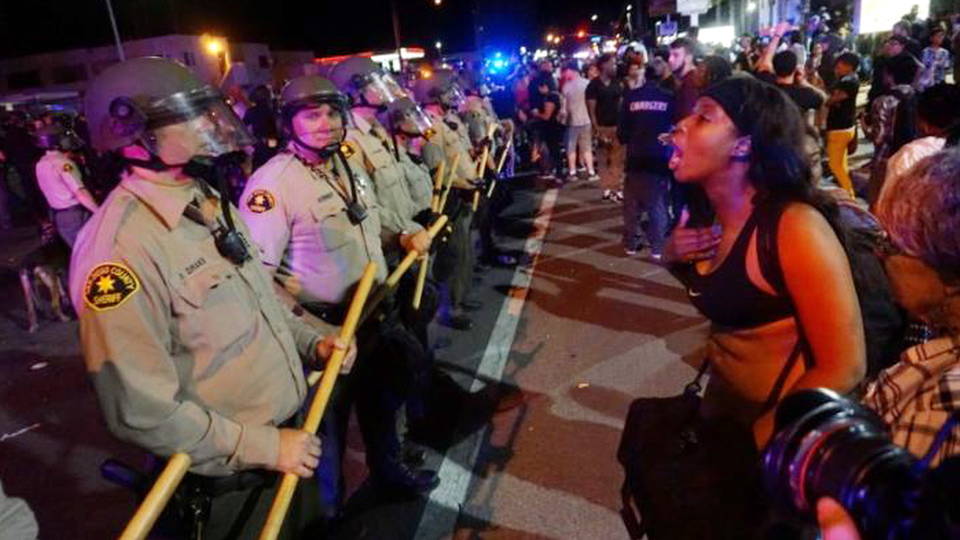 Protests continued Wednesday in the San Diego, California, suburb of El Cajon, where police shot and killed an unarmed African-American man Tuesday after his sister called 911 to report her brother was having a mental health emergency. Eyewitnesses in El Cajon said Alfred Olango was holding his hands up when he was tased by one police officer and then fired upon five times by another officer. Police initially said they fired when Olango pulled out an object. On Wednesday, the police admitted that this object was, in fact, an e-cigarette. This is protester Asaac Ali.
Protests continued Wednesday in the San Diego, California, suburb of El Cajon, where police shot and killed an unarmed African-American man Tuesday after his sister called 911 to report her brother was having a mental health emergency. Eyewitnesses in El Cajon said Alfred Olango was holding his hands up when he was tased by one police officer and then fired upon five times by another officer. Police initially said they fired when Olango pulled out an object. On Wednesday, the police admitted that this object was, in fact, an e-cigarette. This is protester Asaac Ali.
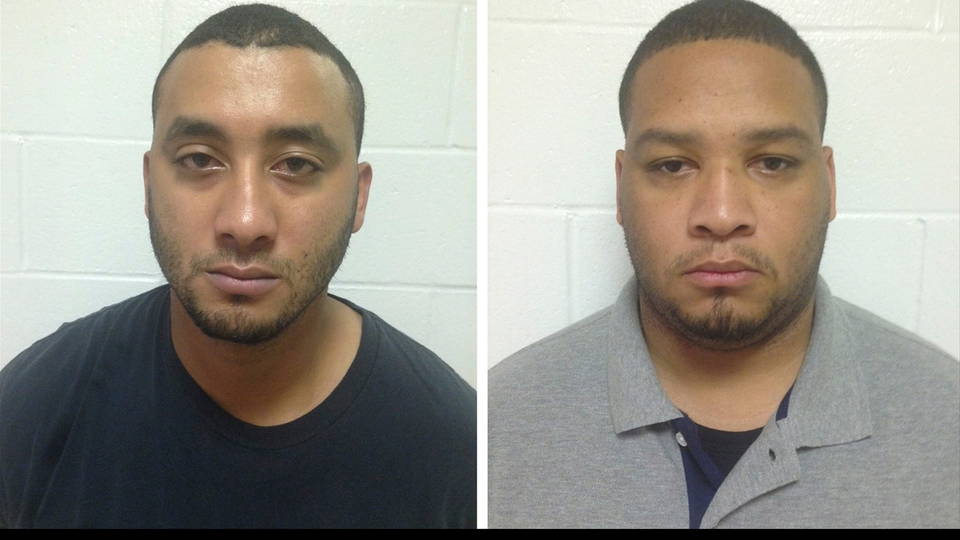 Meanwhile, in Louisiana, a judge has released body camera video showing police officers shooting into a car and killing a six-year-old child in September 2015. The boy, Jeremy Mardis, was in first grade. He was killed on site after being hit by five bullets. Authorities say the marshals began chasing the car after seeing an argument between a man and a woman. When the car chase ended at a dead-end street, the marshals approached the car and opened fire. The video shows the driver, Christopher Few, with his hands in the air. The Louisiana State Police superintendent said the video is "the most disturbing thing I’ve seen." Two U.S. marshals involved in the shooting are on trial facing second-degree murder charges.
Meanwhile, in Louisiana, a judge has released body camera video showing police officers shooting into a car and killing a six-year-old child in September 2015. The boy, Jeremy Mardis, was in first grade. He was killed on site after being hit by five bullets. Authorities say the marshals began chasing the car after seeing an argument between a man and a woman. When the car chase ended at a dead-end street, the marshals approached the car and opened fire. The video shows the driver, Christopher Few, with his hands in the air. The Louisiana State Police superintendent said the video is "the most disturbing thing I’ve seen." Two U.S. marshals involved in the shooting are on trial facing second-degree murder charges.
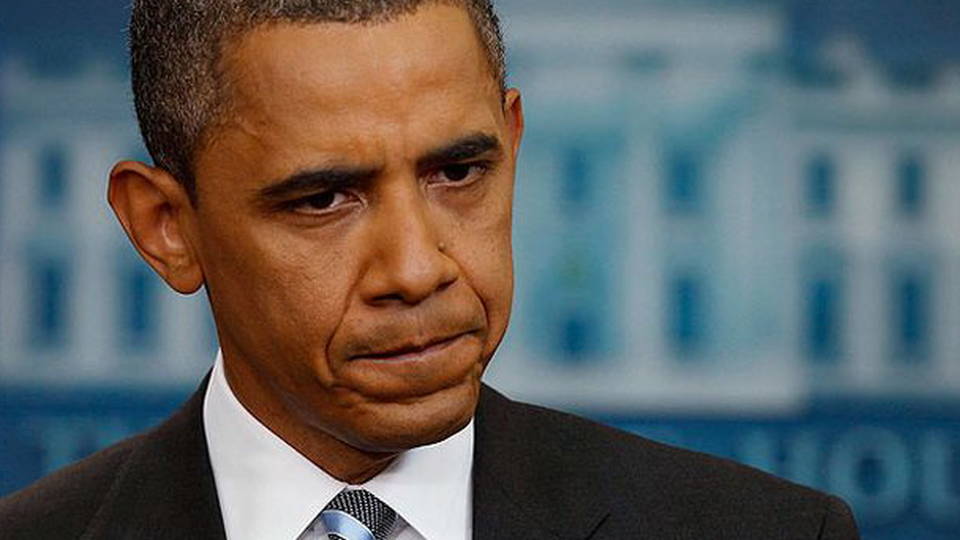 In Washington, D.C., Congress has voted overwhelmingly to allow Americans to sue Saudi Arabia over the 9/11 attacks—overriding President Obama’s veto of the bill. It’s the first time during Obama’s presidency that his veto has been overridden by Congress. The Senate rejected the veto 97 to 1, while the House rejected it 348 to 77. This means the Justice Against Sponsors of Terrorism Act now becomes law. This legislation would allow courts to waive claim of foreign sovereign immunity after an act of terrorism occurs within U.S. borders. This is President Obama speaking to CNN Wednesday.
In Washington, D.C., Congress has voted overwhelmingly to allow Americans to sue Saudi Arabia over the 9/11 attacks—overriding President Obama’s veto of the bill. It’s the first time during Obama’s presidency that his veto has been overridden by Congress. The Senate rejected the veto 97 to 1, while the House rejected it 348 to 77. This means the Justice Against Sponsors of Terrorism Act now becomes law. This legislation would allow courts to waive claim of foreign sovereign immunity after an act of terrorism occurs within U.S. borders. This is President Obama speaking to CNN Wednesday.
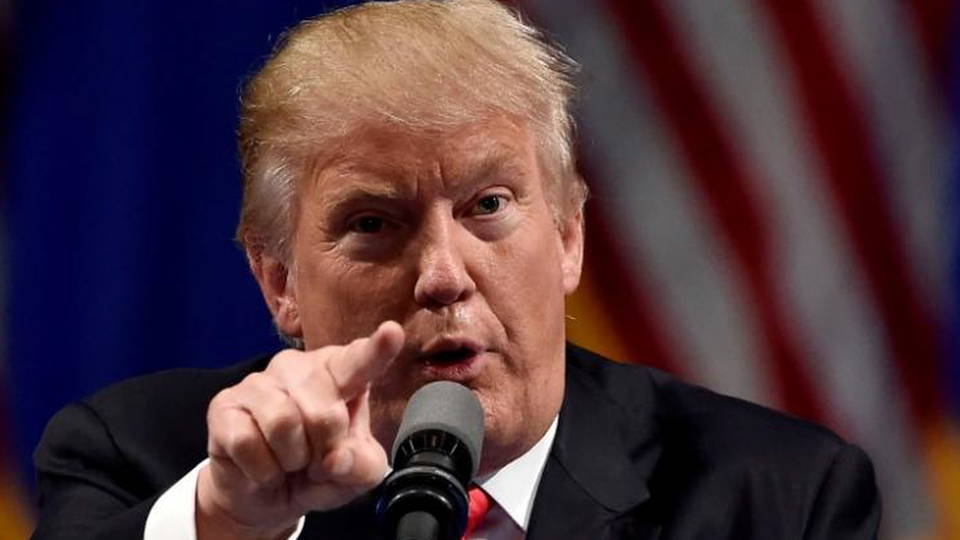 In news from the campaign trail, a new investigation by Newsweek reveals that one of Donald Trump’s businesses violated the U.S. embargo on Cuba and secretly did business there in the late 1990s. The investigation draws on internal company documents showing Trump’s company, then called Trump Hotels & Casino Resorts, spent at least $68,000 in Cuba during a secret business trip to Havana. At the time, it was illegal under U.S. law to spend any corporate money in Cuba. The investigation also reveals that Trump had knowledge of top executives working to cover up the illegal expenditures. Only one year later, Trump wrote in an op-ed in the Miami Herald in 1999: "I would rather take a financial hit than become a financial backer of one of the world’s most brutal dictators. … Of course we should keep the embargo in place."
In news from the campaign trail, a new investigation by Newsweek reveals that one of Donald Trump’s businesses violated the U.S. embargo on Cuba and secretly did business there in the late 1990s. The investigation draws on internal company documents showing Trump’s company, then called Trump Hotels & Casino Resorts, spent at least $68,000 in Cuba during a secret business trip to Havana. At the time, it was illegal under U.S. law to spend any corporate money in Cuba. The investigation also reveals that Trump had knowledge of top executives working to cover up the illegal expenditures. Only one year later, Trump wrote in an op-ed in the Miami Herald in 1999: "I would rather take a financial hit than become a financial backer of one of the world’s most brutal dictators. … Of course we should keep the embargo in place."
 Meanwhile, Forbes magazine is reporting that Donald Trump has lost at least $800 million in personal wealth since 2015. Forbes estimates Trump’s net worth is now about $3.7 billion.
Meanwhile, Forbes magazine is reporting that Donald Trump has lost at least $800 million in personal wealth since 2015. Forbes estimates Trump’s net worth is now about $3.7 billion.
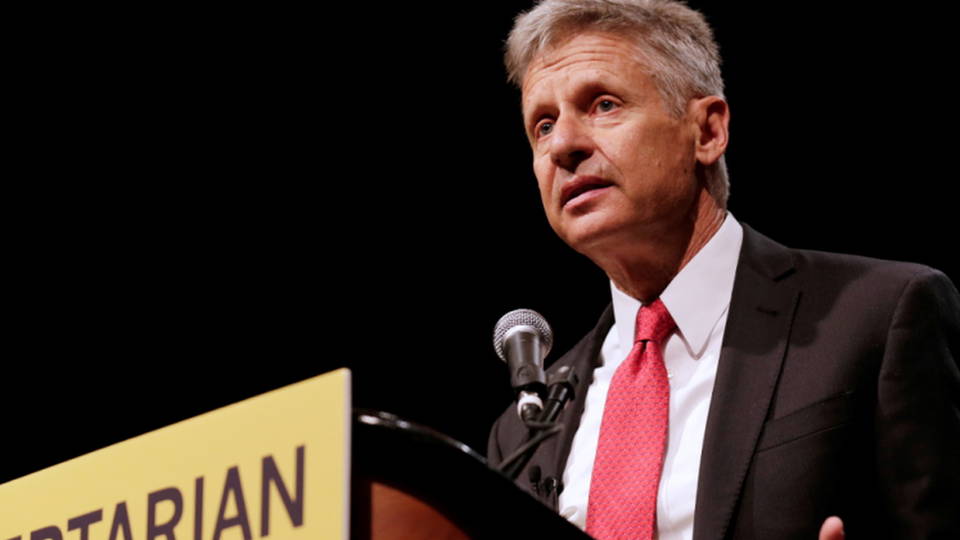 In more news from the campaign trail, Libertarian presidential nominee Gary Johnson stumbled during a town hall interview on MSNBC Wednesday night, when host Chris Matthews asked him to name his favorite foreign leader—and Johnson couldn’t name a single one. Instead, he said he was having an "Aleppo moment"—referring to an earlier interview when he was asked about what he would do to stop the devastating bombing against the major Syrian city, and he responded by asking, "What is Aleppo?" This is Johnson on Wednesday.
In more news from the campaign trail, Libertarian presidential nominee Gary Johnson stumbled during a town hall interview on MSNBC Wednesday night, when host Chris Matthews asked him to name his favorite foreign leader—and Johnson couldn’t name a single one. Instead, he said he was having an "Aleppo moment"—referring to an earlier interview when he was asked about what he would do to stop the devastating bombing against the major Syrian city, and he responded by asking, "What is Aleppo?" This is Johnson on Wednesday.
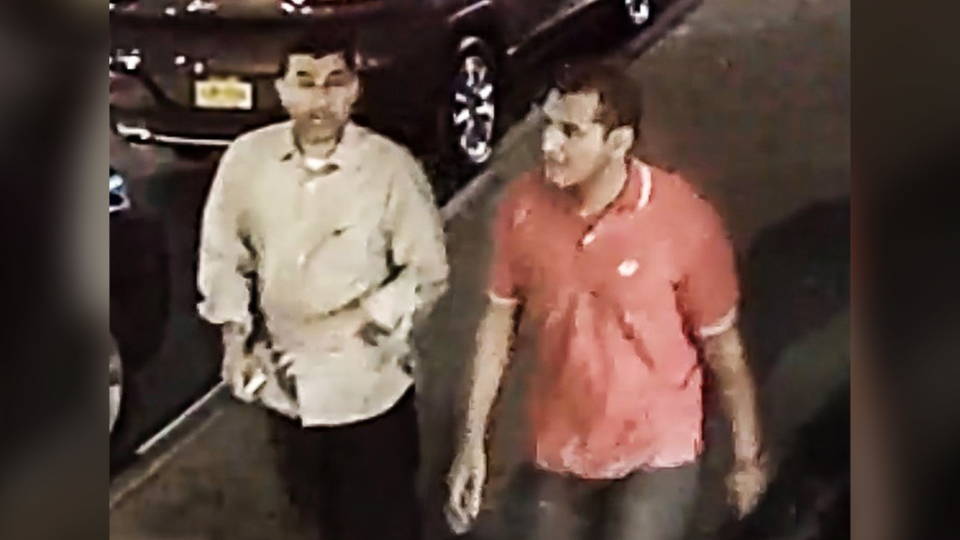 In New York, authorities say they have identified the two men who found a bag containing an unexploded bomb placed on 27th Street in Chelsea earlier this month during the bombings in New York and New Jersey. Authorities say video shows the two men taking the items out of the bag and then walking off with the bag itself. Police described the bag’s contents as a pressure cooker bomb connected to a flip phone, packed with shrapnel and wired to detonate. Authorities say the two men have now been identified as Egyptians who were visiting New York and have since returned to Egypt. Authorities do not think the men have anything to do with the bombings. This comes as the main suspect in the bombings, Ahmad Khan Rahami, has retained the American Civil Liberties Union to represent him, after judges in both New York and New Jersey rejected efforts by public defenders seeking to represent Rahami. The head of the ACLU in New Jersey, Udi Ofer, said the judges’ move "violates the Constitution and needlessly sacrifices civil liberties in the name of national security."
In New York, authorities say they have identified the two men who found a bag containing an unexploded bomb placed on 27th Street in Chelsea earlier this month during the bombings in New York and New Jersey. Authorities say video shows the two men taking the items out of the bag and then walking off with the bag itself. Police described the bag’s contents as a pressure cooker bomb connected to a flip phone, packed with shrapnel and wired to detonate. Authorities say the two men have now been identified as Egyptians who were visiting New York and have since returned to Egypt. Authorities do not think the men have anything to do with the bombings. This comes as the main suspect in the bombings, Ahmad Khan Rahami, has retained the American Civil Liberties Union to represent him, after judges in both New York and New Jersey rejected efforts by public defenders seeking to represent Rahami. The head of the ACLU in New Jersey, Udi Ofer, said the judges’ move "violates the Constitution and needlessly sacrifices civil liberties in the name of national security."
 In Washington, Congress has passed legislation to avoid a government shutdown—only two days before the agencies were expected to run out of money. The measures now keep the federal government funded through December 9. The package includes $1.1 billion to respond to the Zika virus and $500 million of aid for flooding in Louisiana.
In Washington, Congress has passed legislation to avoid a government shutdown—only two days before the agencies were expected to run out of money. The measures now keep the federal government funded through December 9. The package includes $1.1 billion to respond to the Zika virus and $500 million of aid for flooding in Louisiana.
 The White House has authorized a deployment of an additional 600 U.S. troops to Iraq ahead of the battle to retake Mosul from ISIS. The deployment will increase the total number of U.S. troops in Iraq to more than 5,000.
The White House has authorized a deployment of an additional 600 U.S. troops to Iraq ahead of the battle to retake Mosul from ISIS. The deployment will increase the total number of U.S. troops in Iraq to more than 5,000.
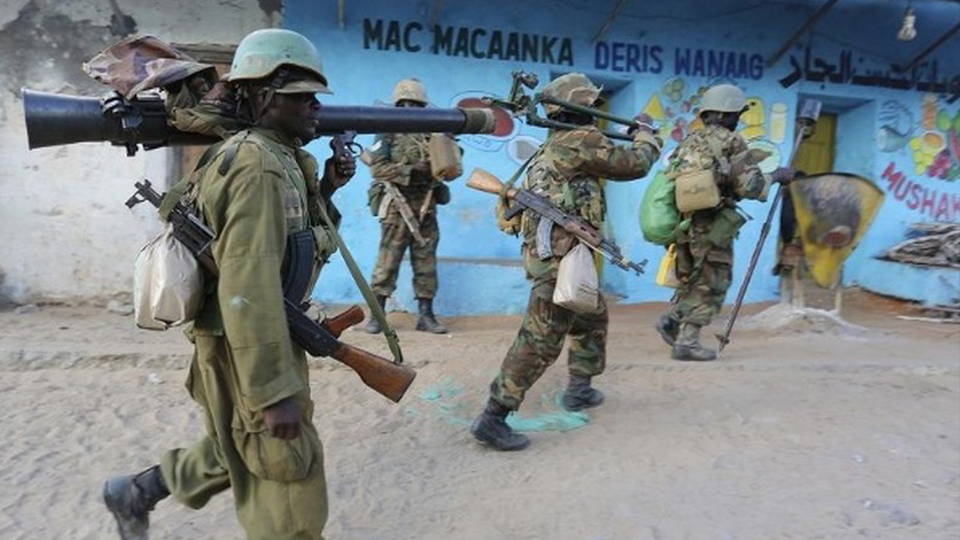 In Somalia, officials say a U.S. airstrike has mistakenly killed more than 20 Somali soldiers. The security minister of Somalia’s Galmudug region says the U.S. strikes were requested by officials in a rival region, who told the U.S. the strikes were targeting al-Shabab militants. The Pentagon says it’s investigating the incident, but has claimed at least nine al-Shabab fighters were killed in the strike.
In Somalia, officials say a U.S. airstrike has mistakenly killed more than 20 Somali soldiers. The security minister of Somalia’s Galmudug region says the U.S. strikes were requested by officials in a rival region, who told the U.S. the strikes were targeting al-Shabab militants. The Pentagon says it’s investigating the incident, but has claimed at least nine al-Shabab fighters were killed in the strike.
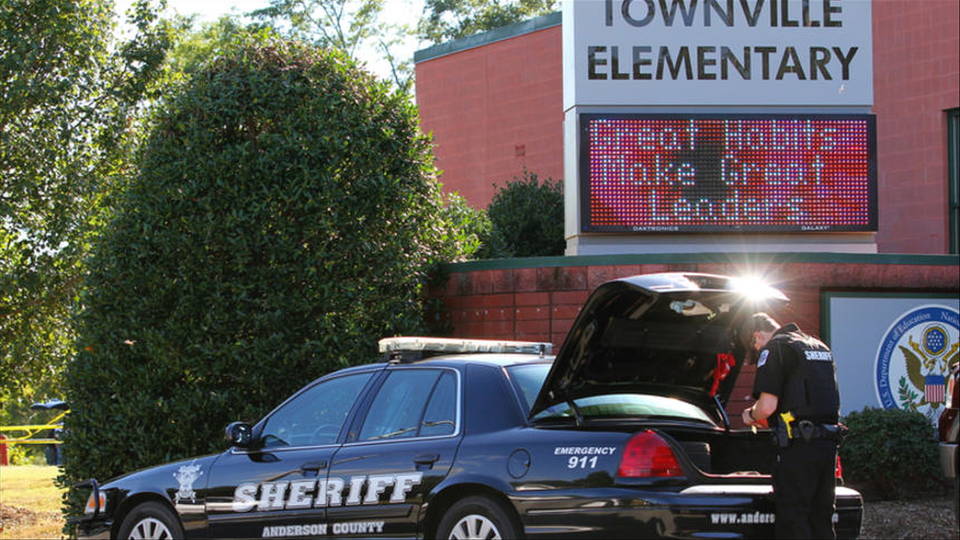 In South Carolina, a 14-year-old boy shot and killed his father and then went on a shooting rampage in the playground of the Townville Elementary School in Anderson County, about 100 miles from Atlanta, on Wednesday. He shot and injured two boys, as well as a teacher, before being arrested. One of the boys, who was shot in the leg, is in critical condition. The shooter has not been named.
In South Carolina, a 14-year-old boy shot and killed his father and then went on a shooting rampage in the playground of the Townville Elementary School in Anderson County, about 100 miles from Atlanta, on Wednesday. He shot and injured two boys, as well as a teacher, before being arrested. One of the boys, who was shot in the leg, is in critical condition. The shooter has not been named.
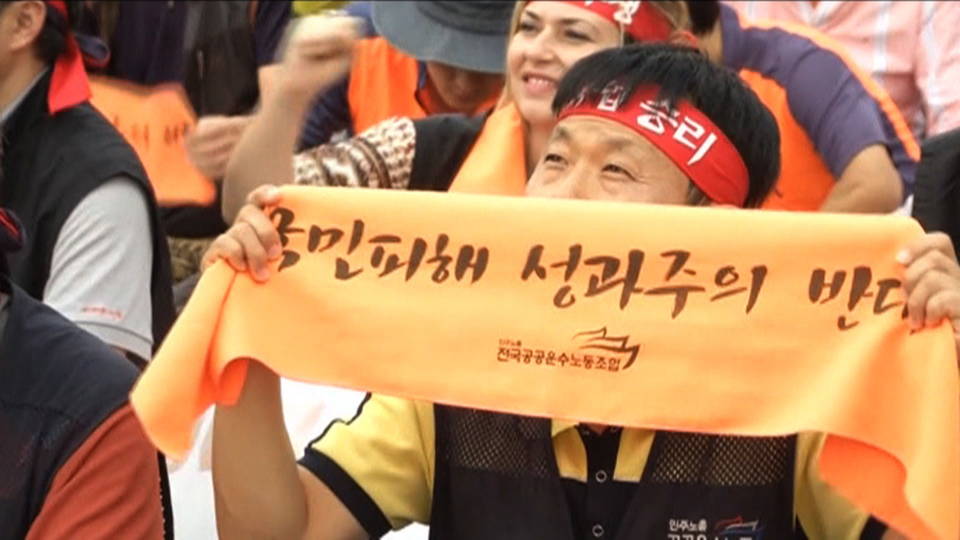 In South Korea, as many as 40,000 unionized workers staged a one-day strike Thursday to protest the government’s attempts to enact legislation tying salaries to productivity rather than seniority. This is one of the union organizers.
In South Korea, as many as 40,000 unionized workers staged a one-day strike Thursday to protest the government’s attempts to enact legislation tying salaries to productivity rather than seniority. This is one of the union organizers.
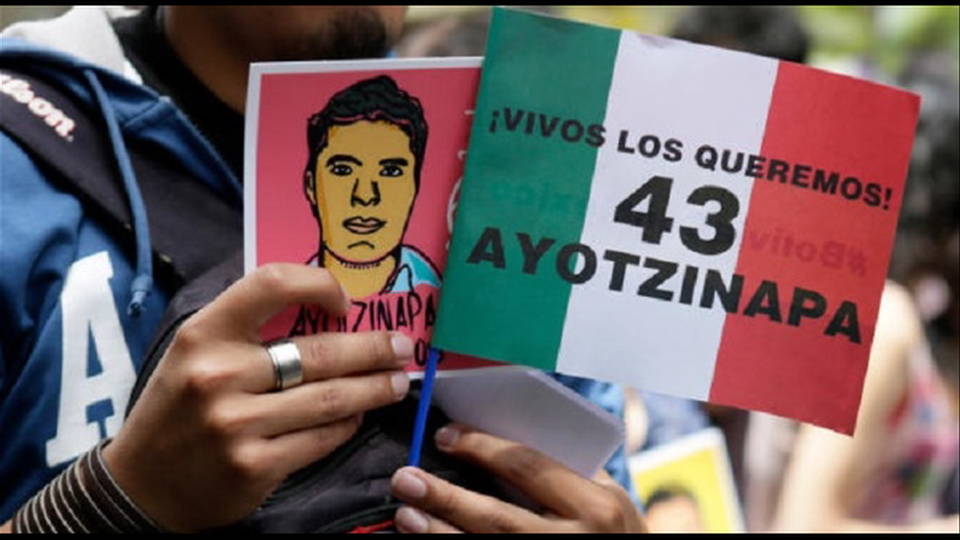 In news from Mexico, about a thousand people marched in the town of Iguala to mark the second anniversary of the kidnapping of 43 students from the Ayotzinapa teachers’ college. The students were attacked by local police and subsequently went missing in the southern Mexican state of Guerrero. This is José Nava García, a student who survived the attack.
In news from Mexico, about a thousand people marched in the town of Iguala to mark the second anniversary of the kidnapping of 43 students from the Ayotzinapa teachers’ college. The students were attacked by local police and subsequently went missing in the southern Mexican state of Guerrero. This is José Nava García, a student who survived the attack.
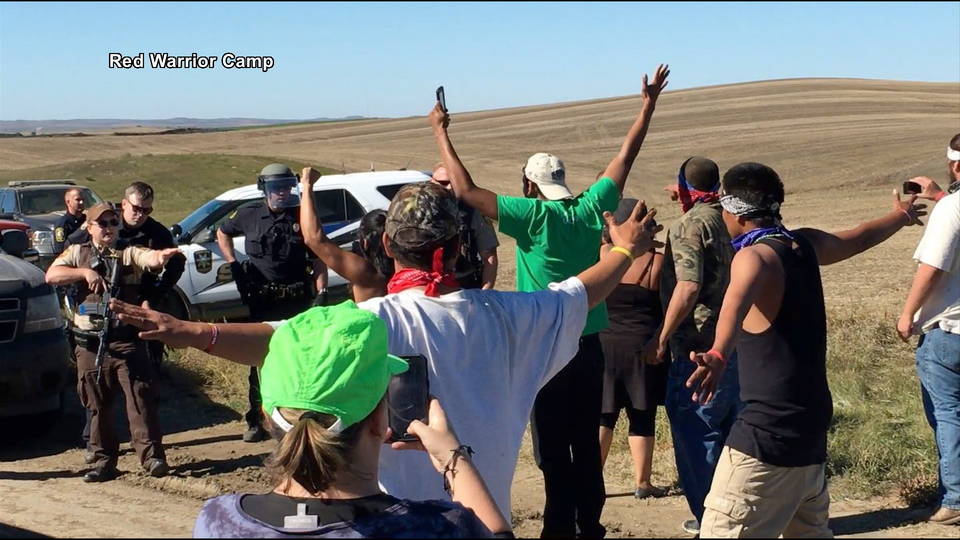 And in North Dakota, 21 people were arrested Wednesday by police in riot gear, while the group was conducting Native American ceremonies to block construction of the $3.8 billion Dakota Access pipeline. The pipeline has faced months of resistance from the Standing Rock Sioux Tribe and members of hundreds of other tribes from across the U.S., Canada and Latin America. Land defenders say police carrying assault rifles responded to the ceremonies with armored vehicles, tear gas and helicopters. This is a Sicangu Lakota grandmother.
-------
And in North Dakota, 21 people were arrested Wednesday by police in riot gear, while the group was conducting Native American ceremonies to block construction of the $3.8 billion Dakota Access pipeline. The pipeline has faced months of resistance from the Standing Rock Sioux Tribe and members of hundreds of other tribes from across the U.S., Canada and Latin America. Land defenders say police carrying assault rifles responded to the ceremonies with armored vehicles, tear gas and helicopters. This is a Sicangu Lakota grandmother.
-------
Donate today:
Follow:



WEB EXCLUSIVE
 Protests continued Wednesday in the San Diego, California, suburb of El Cajon, where police shot and killed an unarmed African-American man Tuesday after his sister called 911 to report her brother was having a mental health emergency. Eyewitnesses in El Cajon said Alfred Olango was holding his hands up when he was tased by one police officer and then fired upon five times by another officer. Police initially said they fired when Olango pulled out an object. On Wednesday, the police admitted that this object was, in fact, an e-cigarette. This is protester Asaac Ali.
Protests continued Wednesday in the San Diego, California, suburb of El Cajon, where police shot and killed an unarmed African-American man Tuesday after his sister called 911 to report her brother was having a mental health emergency. Eyewitnesses in El Cajon said Alfred Olango was holding his hands up when he was tased by one police officer and then fired upon five times by another officer. Police initially said they fired when Olango pulled out an object. On Wednesday, the police admitted that this object was, in fact, an e-cigarette. This is protester Asaac Ali.Asaac Ali: "It’s not just about how I’m feeling about it. It is about how America feel about it, because police are terrorizing America, each and every state. They’re killing people each and every corner. This is a time for America to look into it. This is not ISIS in the Middle East. We have one here: Police are a terrorist, killing people more than ISIS. That’s what we need to look at it, really careful."
This comes as questions are being raised about El Cajon police officer Richard Gonsalves, one of the officers involved in Olango’s shooting. Last year, Gonsalves was sued for sexual harassment after making lewd propositions and texting explicit photos to his subordinate officer. He was demoted to officer from sergeant. Gonsalves was just served with a second suit in August of this year, after the harassment continued. We’ll go to San Diego for more, after headlines.
TOPICS:
Louisiana: Newly Released Video Shows Cops Killing 6-Year-Old Boy
 Meanwhile, in Louisiana, a judge has released body camera video showing police officers shooting into a car and killing a six-year-old child in September 2015. The boy, Jeremy Mardis, was in first grade. He was killed on site after being hit by five bullets. Authorities say the marshals began chasing the car after seeing an argument between a man and a woman. When the car chase ended at a dead-end street, the marshals approached the car and opened fire. The video shows the driver, Christopher Few, with his hands in the air. The Louisiana State Police superintendent said the video is "the most disturbing thing I’ve seen." Two U.S. marshals involved in the shooting are on trial facing second-degree murder charges.
Meanwhile, in Louisiana, a judge has released body camera video showing police officers shooting into a car and killing a six-year-old child in September 2015. The boy, Jeremy Mardis, was in first grade. He was killed on site after being hit by five bullets. Authorities say the marshals began chasing the car after seeing an argument between a man and a woman. When the car chase ended at a dead-end street, the marshals approached the car and opened fire. The video shows the driver, Christopher Few, with his hands in the air. The Louisiana State Police superintendent said the video is "the most disturbing thing I’ve seen." Two U.S. marshals involved in the shooting are on trial facing second-degree murder charges.TOPICS:
Congress Overrides Obama's Veto on Suing Saudi Arabia over 9/11
 In Washington, D.C., Congress has voted overwhelmingly to allow Americans to sue Saudi Arabia over the 9/11 attacks—overriding President Obama’s veto of the bill. It’s the first time during Obama’s presidency that his veto has been overridden by Congress. The Senate rejected the veto 97 to 1, while the House rejected it 348 to 77. This means the Justice Against Sponsors of Terrorism Act now becomes law. This legislation would allow courts to waive claim of foreign sovereign immunity after an act of terrorism occurs within U.S. borders. This is President Obama speaking to CNN Wednesday.
In Washington, D.C., Congress has voted overwhelmingly to allow Americans to sue Saudi Arabia over the 9/11 attacks—overriding President Obama’s veto of the bill. It’s the first time during Obama’s presidency that his veto has been overridden by Congress. The Senate rejected the veto 97 to 1, while the House rejected it 348 to 77. This means the Justice Against Sponsors of Terrorism Act now becomes law. This legislation would allow courts to waive claim of foreign sovereign immunity after an act of terrorism occurs within U.S. borders. This is President Obama speaking to CNN Wednesday.President Barack Obama: "If we eliminate this notion of sovereign immunity, then our men and women in uniform around the world could potentially start seeing ourselves subject to reciprocal laws. And the concern that I’ve had has nothing to do with Saudi Arabia per se or my sympathy for 9/11 families; it has to do with me not wanting a situation in which we’re suddenly exposed to liabilities for all the work that we’re doing all around the world."
The bill had passed both the House and the Senate earlier this year, but President Obama had vetoed it earlier this month. In July, the Obama administration declassified 28 pages from the September 11 report detailing possible ties between the Saudi government and the 9/11 attacks. The declassified documents raise new questions about the role of a Saudi consular official based in the Los Angeles area. He personally helped two of the hijackers after they arrived in Los Angeles in early 2000. Fifteen of the 19 9/11 hijackers were from Saudi Arabia.
TOPICS:
Newsweek: Trump Illegally Violated U.S. Embargo on Cuba
 In news from the campaign trail, a new investigation by Newsweek reveals that one of Donald Trump’s businesses violated the U.S. embargo on Cuba and secretly did business there in the late 1990s. The investigation draws on internal company documents showing Trump’s company, then called Trump Hotels & Casino Resorts, spent at least $68,000 in Cuba during a secret business trip to Havana. At the time, it was illegal under U.S. law to spend any corporate money in Cuba. The investigation also reveals that Trump had knowledge of top executives working to cover up the illegal expenditures. Only one year later, Trump wrote in an op-ed in the Miami Herald in 1999: "I would rather take a financial hit than become a financial backer of one of the world’s most brutal dictators. … Of course we should keep the embargo in place."
In news from the campaign trail, a new investigation by Newsweek reveals that one of Donald Trump’s businesses violated the U.S. embargo on Cuba and secretly did business there in the late 1990s. The investigation draws on internal company documents showing Trump’s company, then called Trump Hotels & Casino Resorts, spent at least $68,000 in Cuba during a secret business trip to Havana. At the time, it was illegal under U.S. law to spend any corporate money in Cuba. The investigation also reveals that Trump had knowledge of top executives working to cover up the illegal expenditures. Only one year later, Trump wrote in an op-ed in the Miami Herald in 1999: "I would rather take a financial hit than become a financial backer of one of the world’s most brutal dictators. … Of course we should keep the embargo in place."TOPICS:
Forbes: Donald Trump Lost $800 Million Last Year
 Meanwhile, Forbes magazine is reporting that Donald Trump has lost at least $800 million in personal wealth since 2015. Forbes estimates Trump’s net worth is now about $3.7 billion.
Meanwhile, Forbes magazine is reporting that Donald Trump has lost at least $800 million in personal wealth since 2015. Forbes estimates Trump’s net worth is now about $3.7 billion.TOPICS:
Gary Johnson Couldn't Name Single Foreign Leader During Town Hall
 In more news from the campaign trail, Libertarian presidential nominee Gary Johnson stumbled during a town hall interview on MSNBC Wednesday night, when host Chris Matthews asked him to name his favorite foreign leader—and Johnson couldn’t name a single one. Instead, he said he was having an "Aleppo moment"—referring to an earlier interview when he was asked about what he would do to stop the devastating bombing against the major Syrian city, and he responded by asking, "What is Aleppo?" This is Johnson on Wednesday.
In more news from the campaign trail, Libertarian presidential nominee Gary Johnson stumbled during a town hall interview on MSNBC Wednesday night, when host Chris Matthews asked him to name his favorite foreign leader—and Johnson couldn’t name a single one. Instead, he said he was having an "Aleppo moment"—referring to an earlier interview when he was asked about what he would do to stop the devastating bombing against the major Syrian city, and he responded by asking, "What is Aleppo?" This is Johnson on Wednesday.Chris Matthews: "Who’s your favorite foreign leader?"
Gary Johnson: "Who’s my favorite—"
Chris Matthews: "Any. Just name anywhere in the—any one of the continents, any country. Name one foreign leader that you respect and look up to. Anybody."
William Weld: "Mine was Shimon Peres."
Chris Matthews: "No, no, OK. I’m talking about living. Go ahead. You’ve got to do this. Anywhere. Any continent. Canada. Mexico. Europe, over there. Asia. South America. Africa. Name a foreign leader that you respect."
Gary Johnson: "I guess I’m having an Aleppo moment in the former—former president of Mexico."
Chris Matthews: "But I’m giving you the whole world!"
Gary Johnson: "I know. I know. I know. I know."
Chris Matthews: "Anybody in the world you like. Anybody. Pick any leader."
Gary Johnson: "The former president of Mexico."
Chris Matthews: "Now—which one?"
Gary Johnson: "I’m having a brain—I’m having a brainfreeze."
Chris Matthews: "Well, name anybody."
TOPICS:
Officials Say They've Identified Two Men Who Found Bag with Unexploded Bomb
 In New York, authorities say they have identified the two men who found a bag containing an unexploded bomb placed on 27th Street in Chelsea earlier this month during the bombings in New York and New Jersey. Authorities say video shows the two men taking the items out of the bag and then walking off with the bag itself. Police described the bag’s contents as a pressure cooker bomb connected to a flip phone, packed with shrapnel and wired to detonate. Authorities say the two men have now been identified as Egyptians who were visiting New York and have since returned to Egypt. Authorities do not think the men have anything to do with the bombings. This comes as the main suspect in the bombings, Ahmad Khan Rahami, has retained the American Civil Liberties Union to represent him, after judges in both New York and New Jersey rejected efforts by public defenders seeking to represent Rahami. The head of the ACLU in New Jersey, Udi Ofer, said the judges’ move "violates the Constitution and needlessly sacrifices civil liberties in the name of national security."
In New York, authorities say they have identified the two men who found a bag containing an unexploded bomb placed on 27th Street in Chelsea earlier this month during the bombings in New York and New Jersey. Authorities say video shows the two men taking the items out of the bag and then walking off with the bag itself. Police described the bag’s contents as a pressure cooker bomb connected to a flip phone, packed with shrapnel and wired to detonate. Authorities say the two men have now been identified as Egyptians who were visiting New York and have since returned to Egypt. Authorities do not think the men have anything to do with the bombings. This comes as the main suspect in the bombings, Ahmad Khan Rahami, has retained the American Civil Liberties Union to represent him, after judges in both New York and New Jersey rejected efforts by public defenders seeking to represent Rahami. The head of the ACLU in New Jersey, Udi Ofer, said the judges’ move "violates the Constitution and needlessly sacrifices civil liberties in the name of national security."TOPICS:
Ex-Ally to Chris Christie Says Gov. Knew of G.W. Bridge Lane Closure Plan
In more political news, New Jersey Governor Chris Christie is again under fire over the George Washington Bridge lane closures. Prosecutors say Christie’s top aides conspired to create a traffic jam to punish the mayor of Fort Lee for failing to endorse Christie’s re-election in 2013. Now, a former Port Authority official and former ally to Christie, David Wildstein, has testified in federal court that Christie knew all about the plan ahead of time. Wildstein says Christie was told about the plan two days before the lane closures began during a September 11 memorial service—and that Christie laughed at the idea.
TOPICS:
Congress Passes Bill to Avoid Gov't Shutdown
 In Washington, Congress has passed legislation to avoid a government shutdown—only two days before the agencies were expected to run out of money. The measures now keep the federal government funded through December 9. The package includes $1.1 billion to respond to the Zika virus and $500 million of aid for flooding in Louisiana.
In Washington, Congress has passed legislation to avoid a government shutdown—only two days before the agencies were expected to run out of money. The measures now keep the federal government funded through December 9. The package includes $1.1 billion to respond to the Zika virus and $500 million of aid for flooding in Louisiana.White House Authorizes 600 Additional U.S. Troops to Iraq
 The White House has authorized a deployment of an additional 600 U.S. troops to Iraq ahead of the battle to retake Mosul from ISIS. The deployment will increase the total number of U.S. troops in Iraq to more than 5,000.
The White House has authorized a deployment of an additional 600 U.S. troops to Iraq ahead of the battle to retake Mosul from ISIS. The deployment will increase the total number of U.S. troops in Iraq to more than 5,000.TOPICS:
Somalia: Officials Say U.S. Airstrike Killed 20 Somali Soldiers
 In Somalia, officials say a U.S. airstrike has mistakenly killed more than 20 Somali soldiers. The security minister of Somalia’s Galmudug region says the U.S. strikes were requested by officials in a rival region, who told the U.S. the strikes were targeting al-Shabab militants. The Pentagon says it’s investigating the incident, but has claimed at least nine al-Shabab fighters were killed in the strike.
In Somalia, officials say a U.S. airstrike has mistakenly killed more than 20 Somali soldiers. The security minister of Somalia’s Galmudug region says the U.S. strikes were requested by officials in a rival region, who told the U.S. the strikes were targeting al-Shabab militants. The Pentagon says it’s investigating the incident, but has claimed at least nine al-Shabab fighters were killed in the strike.TOPICS:
South Carolina: 14-Year-Old Kills Father, Shoots 3 at Elementary School
 In South Carolina, a 14-year-old boy shot and killed his father and then went on a shooting rampage in the playground of the Townville Elementary School in Anderson County, about 100 miles from Atlanta, on Wednesday. He shot and injured two boys, as well as a teacher, before being arrested. One of the boys, who was shot in the leg, is in critical condition. The shooter has not been named.
In South Carolina, a 14-year-old boy shot and killed his father and then went on a shooting rampage in the playground of the Townville Elementary School in Anderson County, about 100 miles from Atlanta, on Wednesday. He shot and injured two boys, as well as a teacher, before being arrested. One of the boys, who was shot in the leg, is in critical condition. The shooter has not been named.TOPICS:
South Korea: 40,000+ Unionized Workers Stage One-Day Strike
 In South Korea, as many as 40,000 unionized workers staged a one-day strike Thursday to protest the government’s attempts to enact legislation tying salaries to productivity rather than seniority. This is one of the union organizers.
In South Korea, as many as 40,000 unionized workers staged a one-day strike Thursday to protest the government’s attempts to enact legislation tying salaries to productivity rather than seniority. This is one of the union organizers.Park Joon-Hyoung: "About 60,000 workers from all over the country went on strike today, and about 50,000 workers joined the rally here. We demand a stop to adopting the illegal wage system based on performance, pushed by the government. It will hurt the people."
TOPICS:
Mexico: Iguala Marks 2nd Anniversary of 43 Students' Disappearance
 In news from Mexico, about a thousand people marched in the town of Iguala to mark the second anniversary of the kidnapping of 43 students from the Ayotzinapa teachers’ college. The students were attacked by local police and subsequently went missing in the southern Mexican state of Guerrero. This is José Nava García, a student who survived the attack.
In news from Mexico, about a thousand people marched in the town of Iguala to mark the second anniversary of the kidnapping of 43 students from the Ayotzinapa teachers’ college. The students were attacked by local police and subsequently went missing in the southern Mexican state of Guerrero. This is José Nava García, a student who survived the attack.José Nava García: "We are here to demand justice, because we don’t forget. We, as attack survivors of Ayotzinapa, we are constantly aware of our disappeared classmates, because that night the police were unfortunately waging an all-out war on us, a war without mercy. They waged war on us, and we didn’t at this time understand what was happening. We were just freshmen."
Meanwhile, in the bordering state of Michoacán, police have arrested at least 47 students from another teachers’ college, after a confrontation with police clad in riot gear. Police say the students had stolen buses. Some news reports say police fired at the students during the confrontation. On Wednesday, fellow students blocked highways to demand their classmates be released.
TOPICS:
21 Arrested Resisting Construction of Dakota Access Pipeline
 And in North Dakota, 21 people were arrested Wednesday by police in riot gear, while the group was conducting Native American ceremonies to block construction of the $3.8 billion Dakota Access pipeline. The pipeline has faced months of resistance from the Standing Rock Sioux Tribe and members of hundreds of other tribes from across the U.S., Canada and Latin America. Land defenders say police carrying assault rifles responded to the ceremonies with armored vehicles, tear gas and helicopters. This is a Sicangu Lakota grandmother.
And in North Dakota, 21 people were arrested Wednesday by police in riot gear, while the group was conducting Native American ceremonies to block construction of the $3.8 billion Dakota Access pipeline. The pipeline has faced months of resistance from the Standing Rock Sioux Tribe and members of hundreds of other tribes from across the U.S., Canada and Latin America. Land defenders say police carrying assault rifles responded to the ceremonies with armored vehicles, tear gas and helicopters. This is a Sicangu Lakota grandmother.Land defender: "We had a really nice ceremony. And then we looked, and over that way, and the police—there was a few police. And the next thing I knew, there were like 40 police, and they were all dressed in riot gear. We did exactly what we were told to do, except the ones who were in the road, just to tell everybody, 'Keep moving. Keep moving. Keep moving.' And I’ve never in my life seen a gun in real life. And I’ve never had a gun pointed at me. And we all went—I went into shock."
Donate today:
Follow:




WEB EXCLUSIVE

Arlie Russell Hochschild on Strangers in Their Own Land: Anger and Mourning on the AmericaPart 2
CLASS VISITS

Dear Educator: TheDemocracy Now!Education Team invites you to bring your students to our live broadcast at our New York City studio.
NEW BOOK

Senior TV Producer
COLUMN

"Solidarity From Solitary: The National Prison Strike" by Amy Goodman & Denis Moynihan
Grass-roots organizing, the hard work of building movements, can be grueling. Pay is often low or nonexistent. Success is never assured. As Martin Luther King Jr. said, “The arc of the moral universe is long, but it bends toward justice.” But it doesn’t bend itself. Right now, under some of the most repressive circumstances that exist in the United States, a national movement is growing for prisoners’ rights. The United States has less than 5 percent of the world’s population and almost 25 percent of the world’s prisoners. This movement is rippling out from a solitary-confinement cell inside the Holman Correctional Facility in rural Atmore, Alabama.
“These strikes are our method for challenging mass incarceration. The prison system is a continuation of the slave system,” a man named Kinetik Justice told us on the “Democracy Now!” news hour last May. He was using a contraband cellphone from inside solitary confinement in Holman, where he was being held as punishment for his organizing. He and fellow prisoners around Alabama launched a 10-day strike on May 1, International Workers’ Day, refusing to engage in prison labor. “The reform and changes that we’ve been fighting for in Alabama, we’ve tried petitioning through the courts. We’ve tried to get in touch with our legislators. ... We understood that our incarceration was pretty much about our labor and the money that was being generated through the prison system.”
Kinetik Justice co-founded the Free Alabama Movement (FAM), to organize prisoners against exploitative prison-labor programs. Despite having no access to the internet, they have a website with a downloadable book by FAM co-founder Melvin Ray that details their plight in the Alabama prison system and how they are organizing. Ray, also incarcerated, opens the book with the lines: “FREEDOM ... Make no mistake about it ... That’s the business of Free Alabama Movement. At some point, we (prisoners) have got to get to the point where not only have we had enough of the inhumane and unconstitutional living conditions that we are confined in, but we also have got to get to the point where we are ready, willing, and able to do something about it. This ‘something’ is a statewide shutdown on Free Labor in the form of a Non-Violent and Peaceful Protest for Civil and Human Rights.”
Their organizing continued after the May Day strike, and went national. On Sept. 9, prisoners in at least 24 states participated in a coordinated strike, marking the 45th anniversary of the 1971 prison uprising at New York state’s infamous Attica prison. Today’s striking prisoners are protesting long-term isolation, inadequate health care, overcrowding, violent attacks and slave labor.
Pastor Kenneth Glasgow of Alabama founded T.O.P.S., The Ordinary People Society, which supports prisoners and ex-convicts. An ex-prisoner himself, he told us: “Those who are incarcerated are looking at the fact that people that have paid taxes for them to be rehabilitated, for them to be educated, for them to be trained, in order to come out into society — because 98 percent of the people in prison are coming out, and in order for them to come out and be able to be productive citizens, they need to have these skills and education and all. ... And yet, the taxpayers are paying anywhere from $31,000 to $80,000 per year, depending on what state you’re in, for them to get this rehabilitation and education, and they’re not getting it. What they’re getting is being used for free prison labor.”
Last Saturday night, the Holman prisoners were joined in their strike by some unlikely allies: the prison guards themselves. Almost all the guards refused to show up for their 12-hour shift. On Sept. 1, Alabama Corrections Officer Kenneth Bettis, 44, was stabbed at Holman. He died two weeks later. Kinetic Justice spoke out on “Democracy Now!” again this week, and explained: “For weeks we’ve been communicating back and forth. This administration really has no regard for human life. And [the guards] are beginning to see that it’s not just directed at the men that are incarcerated here, that the violence that they’ve created actually spills over to the officers, as well. And a lot of them are terrified of what’s going on.”
The national scope of the prisoner strike, with actions in 40 to 50 prisons around the U.S., is truly historic, as is the solidarity demonstrated between the prisoners and the guards at Holman this week. Shut behind walls, denied access to the internet and even telephones, and prevented from easily communicating with media outlets, these prisoners are leading their own movement, with solidarity from thousands outside. “Slavery dies hard in the South,” Melvin Ray writes in his book. Through their organizing, though, these striking prisoners are bending that arc of the moral universe, ever closer to justice.
-------207 West 25th Street, 11th Floor
New York, New York 10001, United States
-------
-------




No comments:
Post a Comment